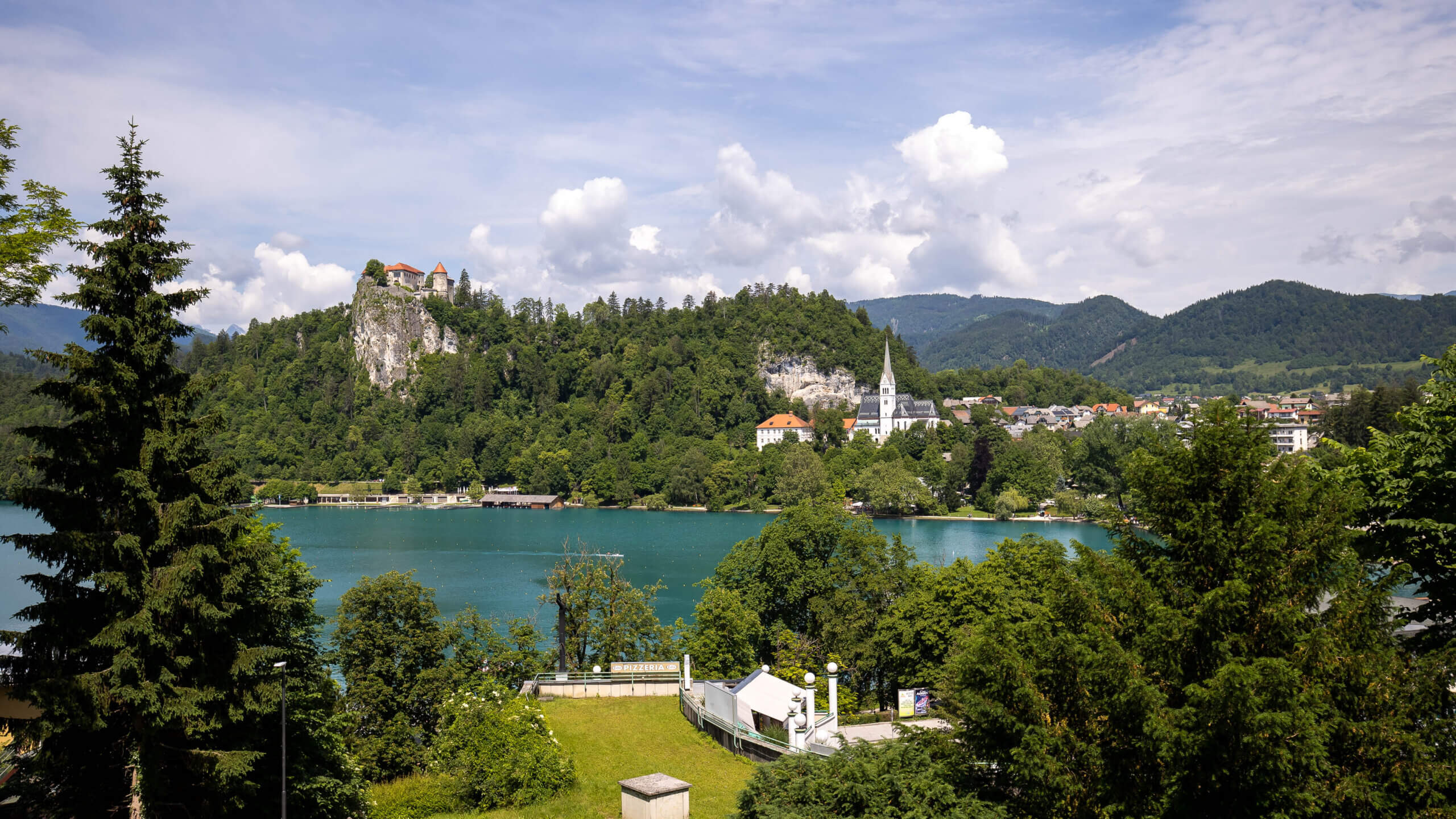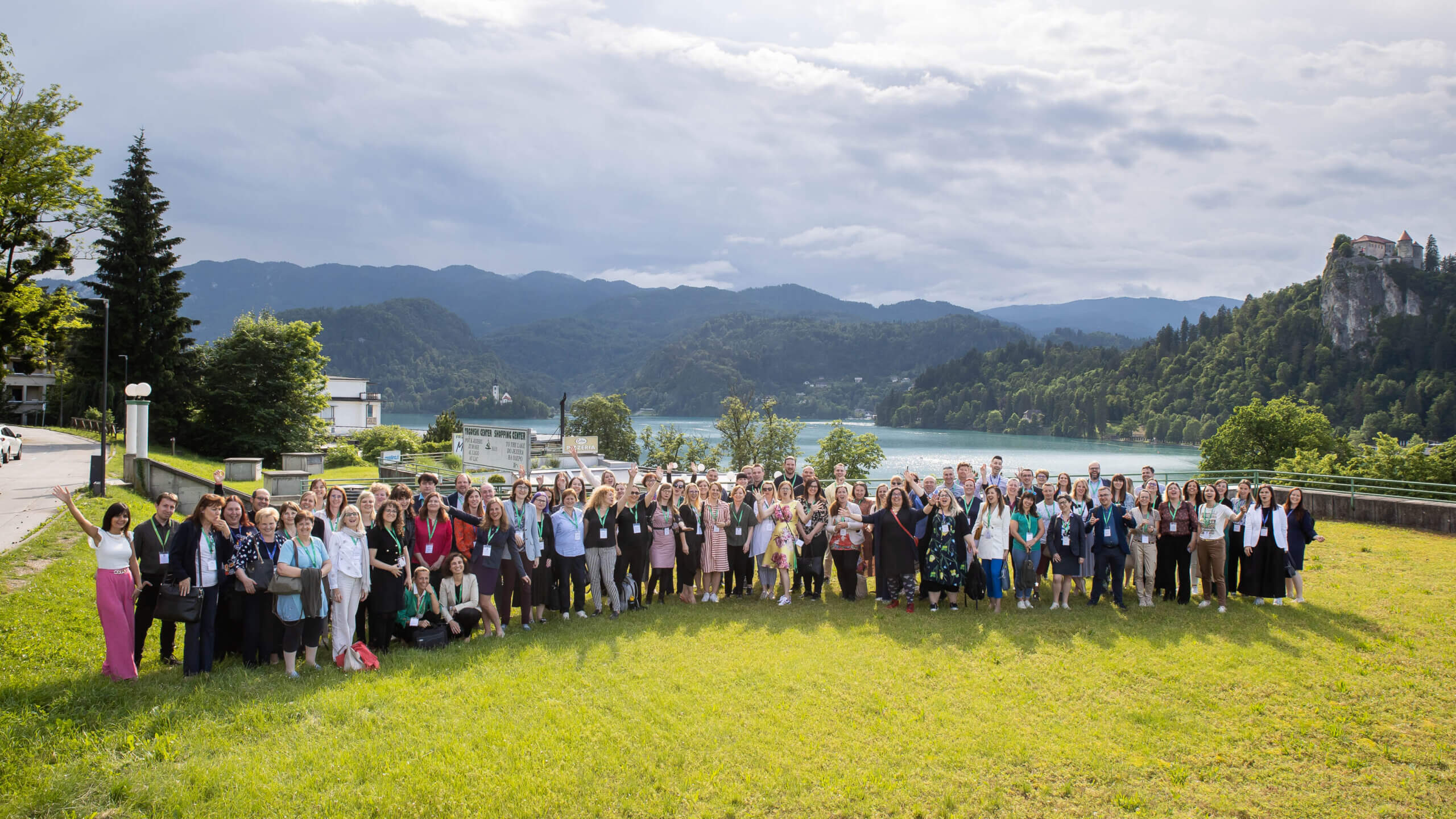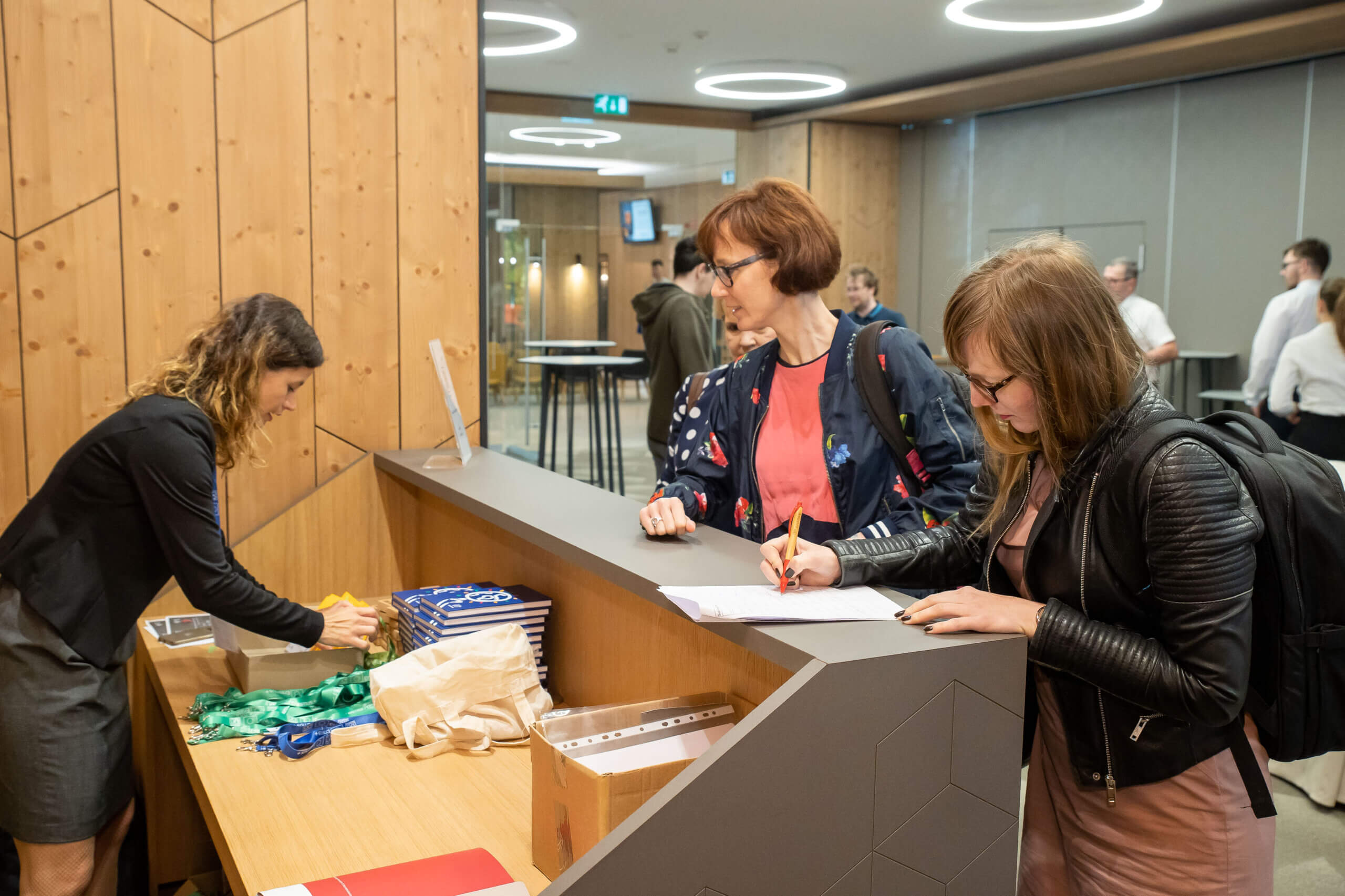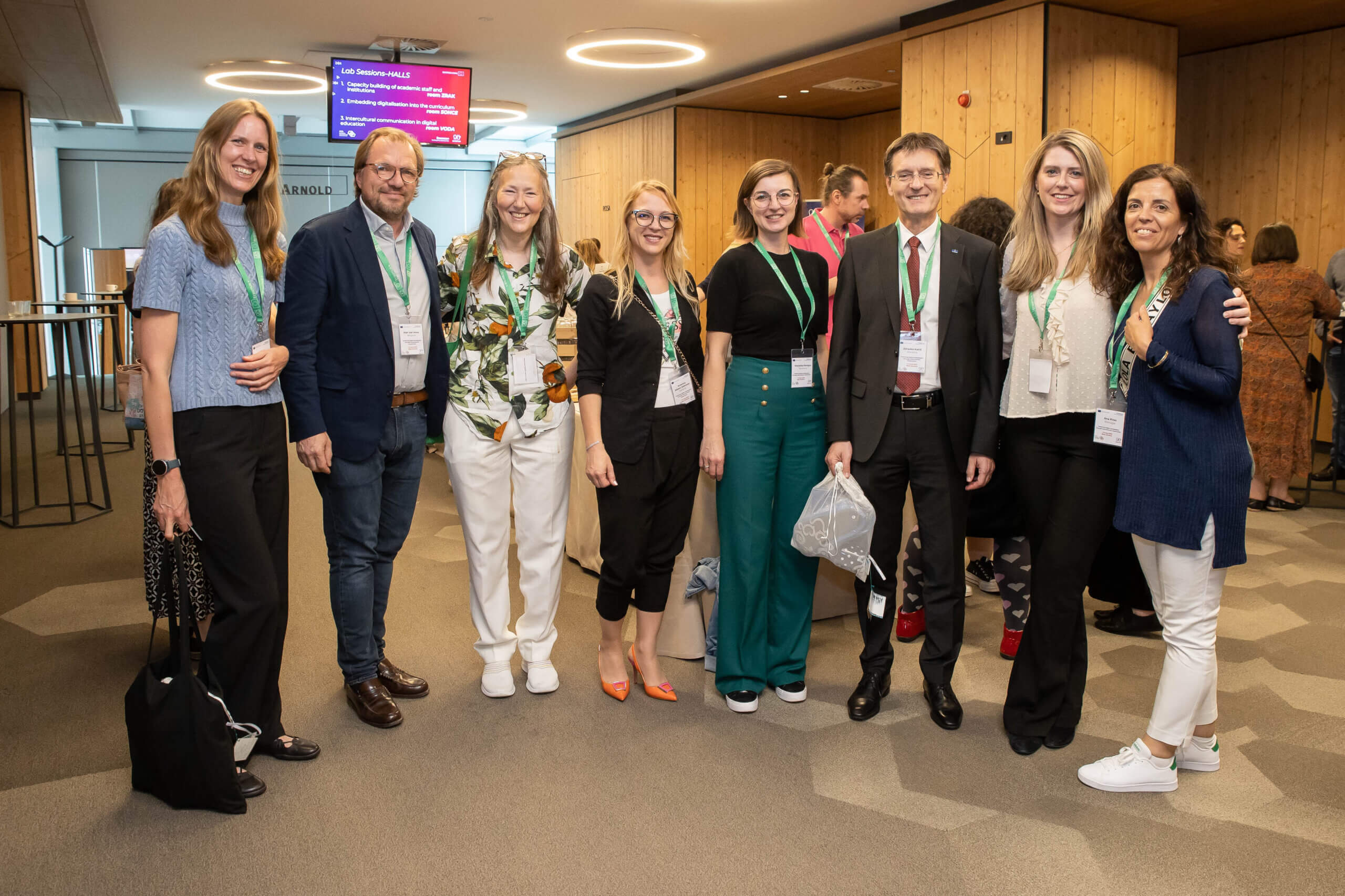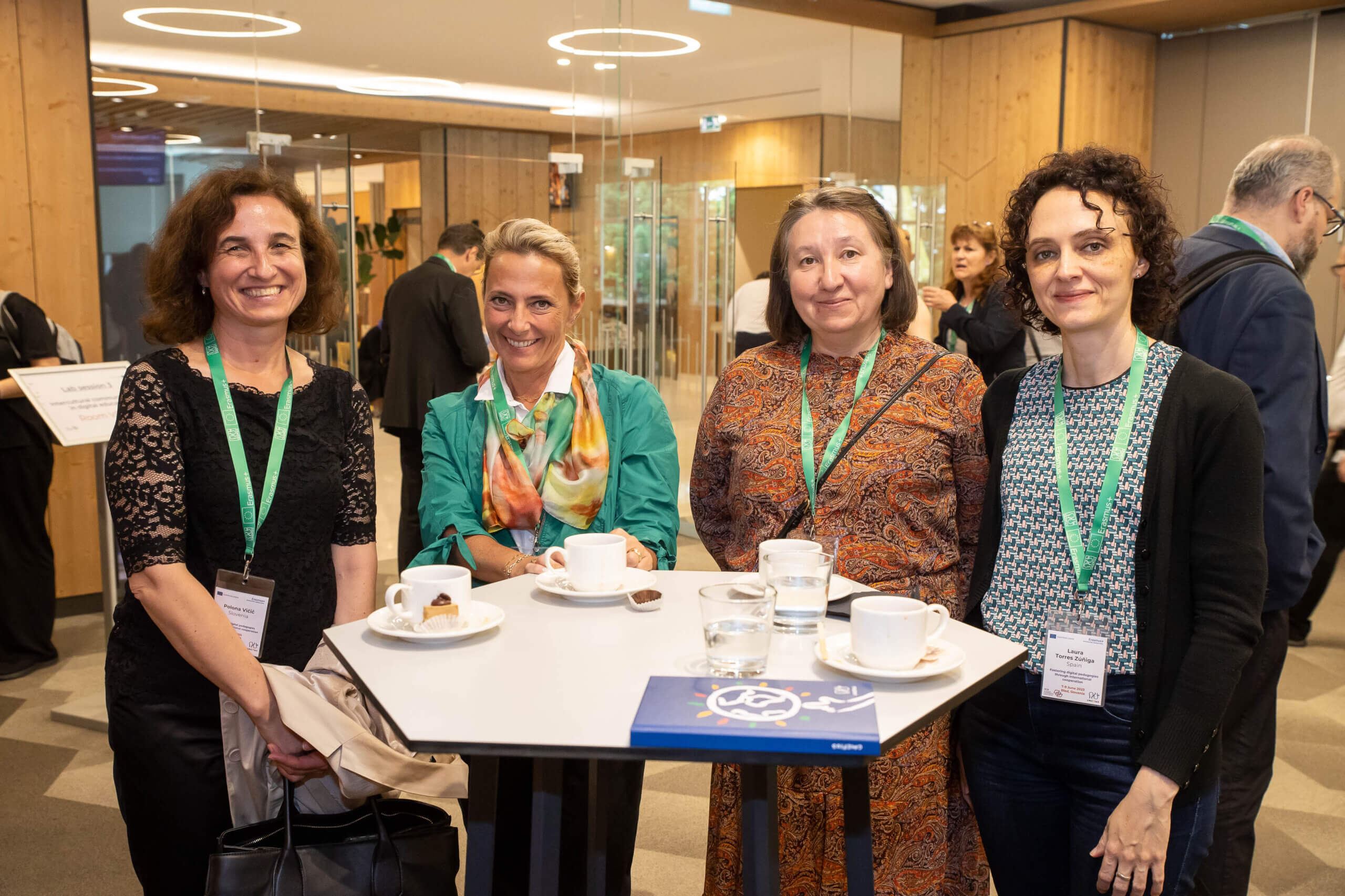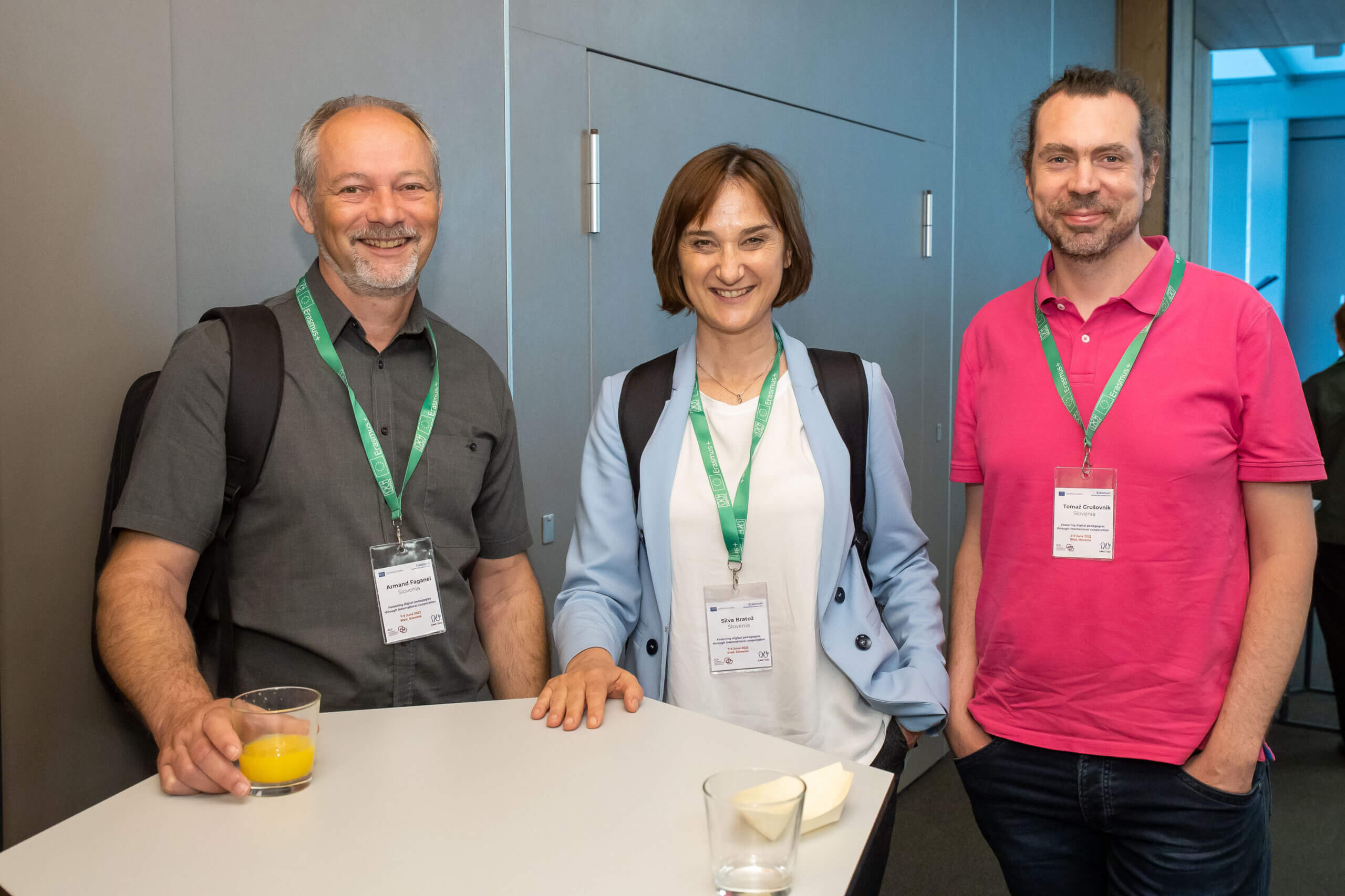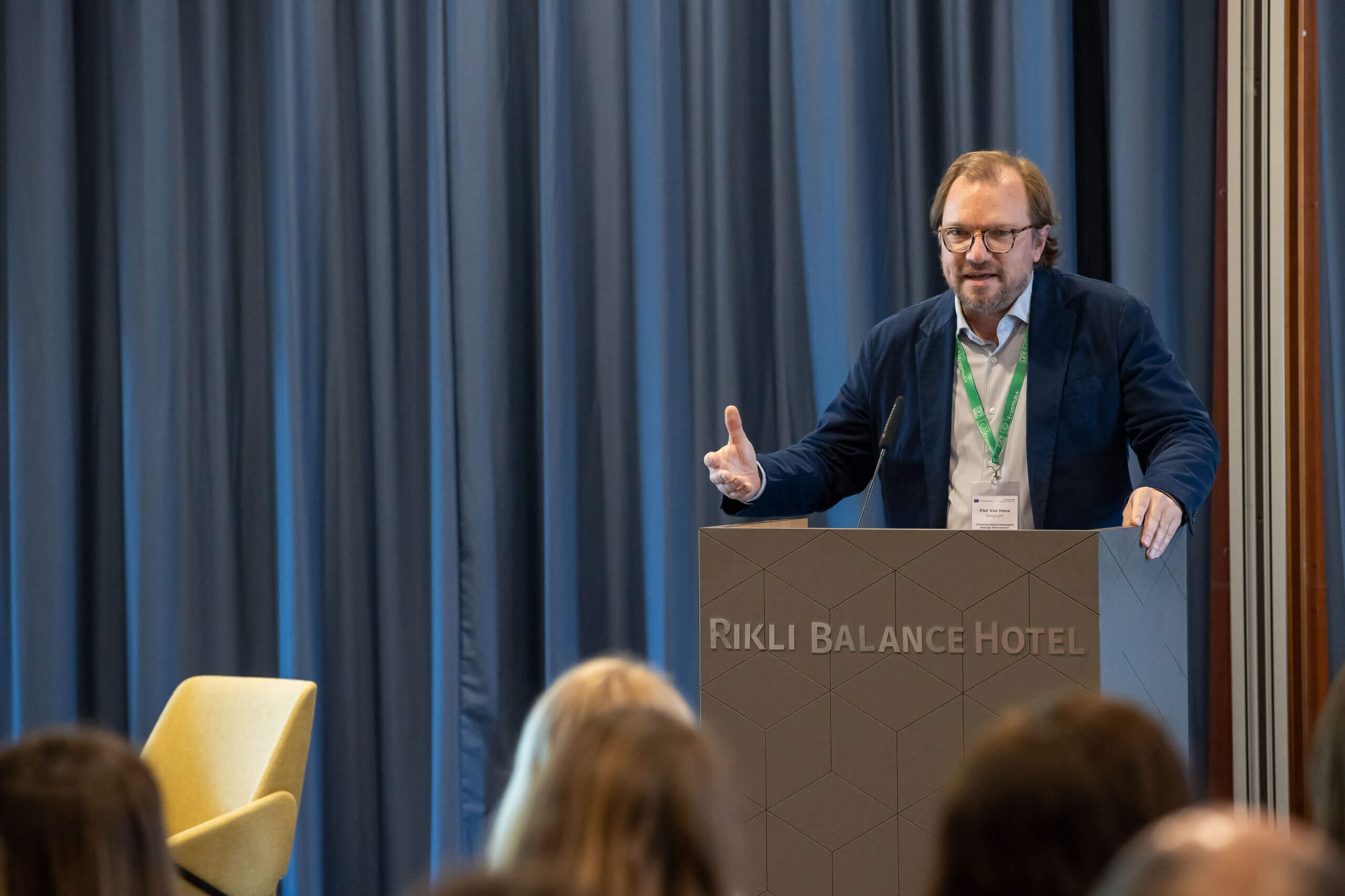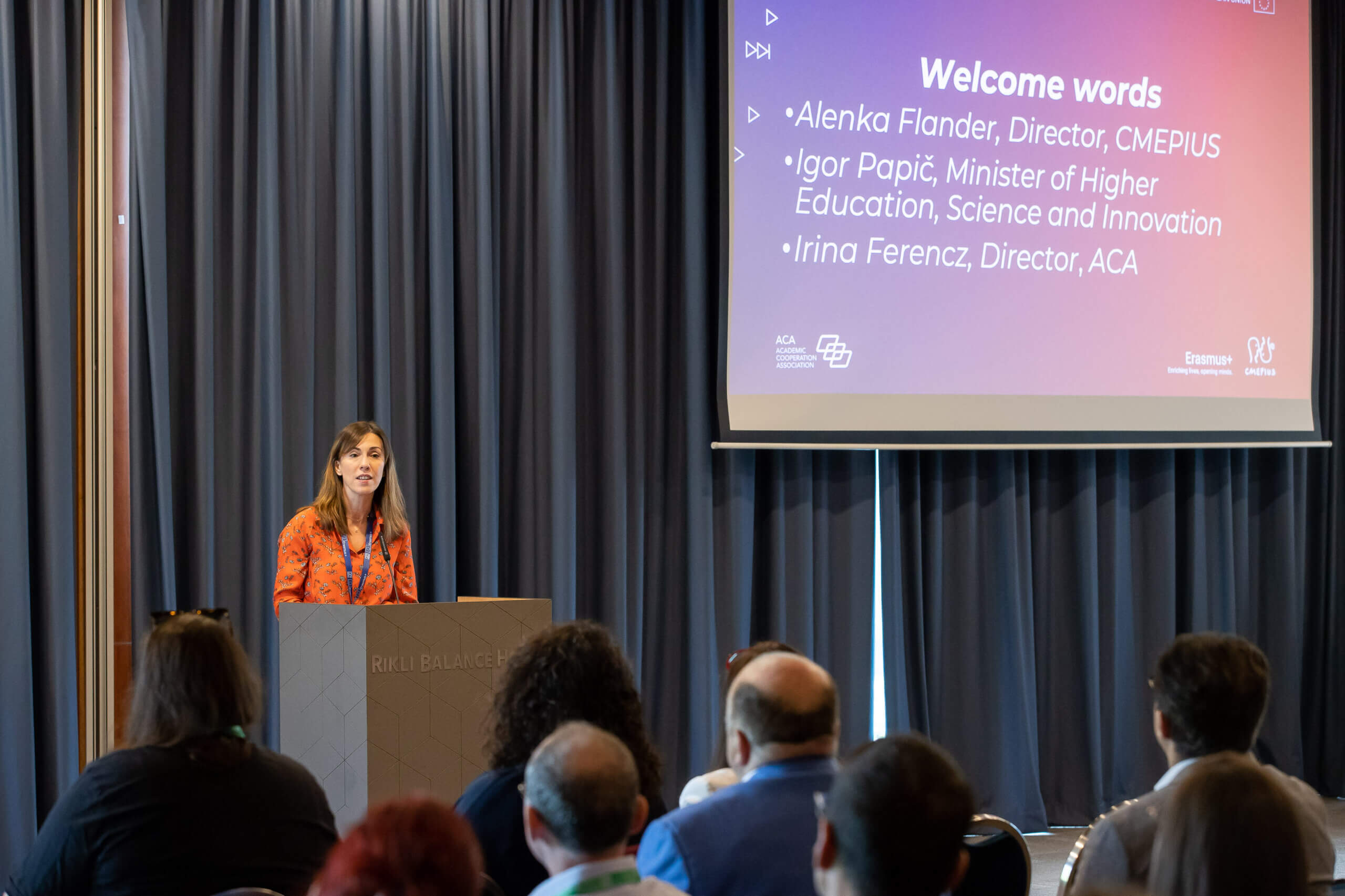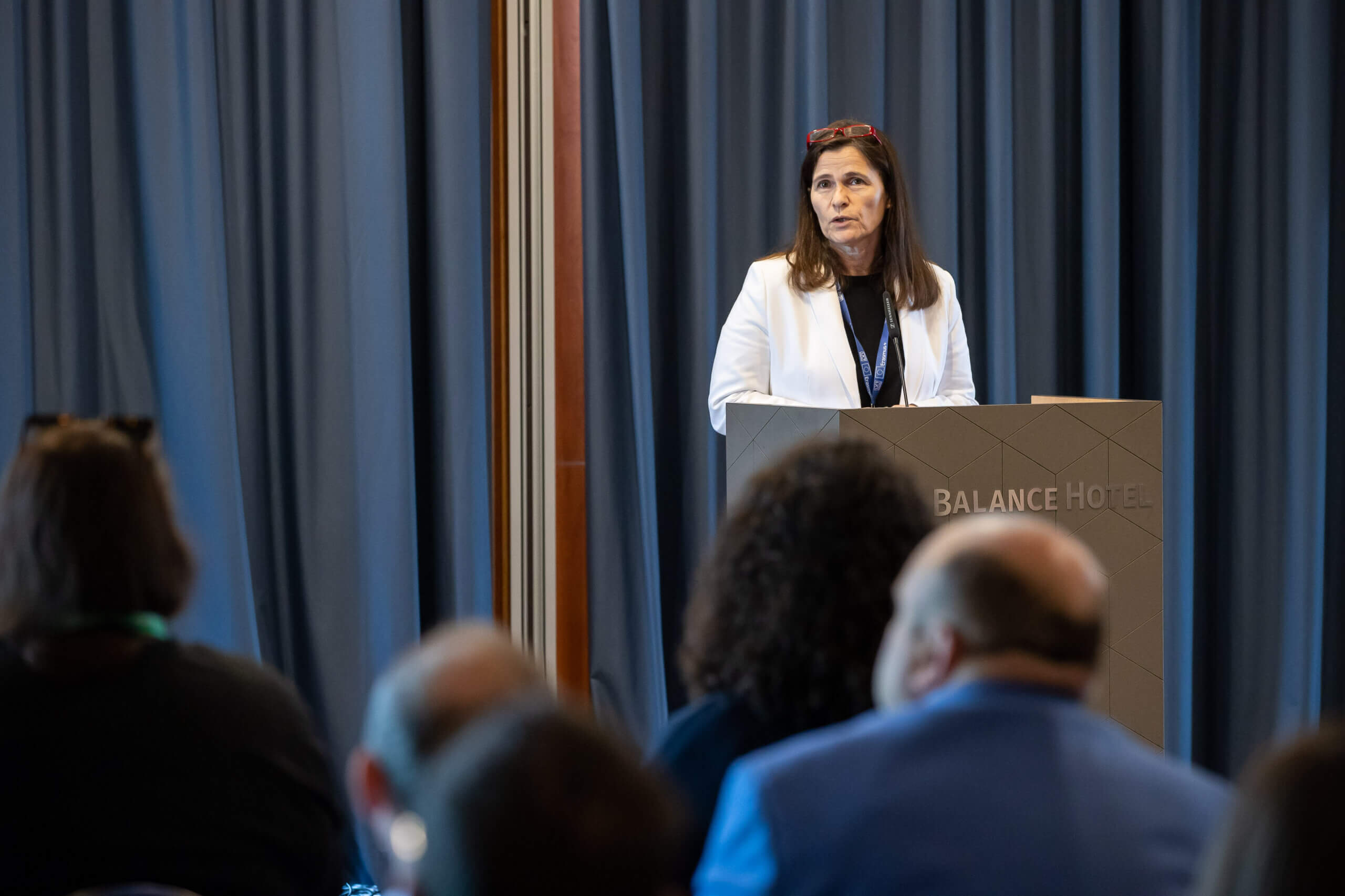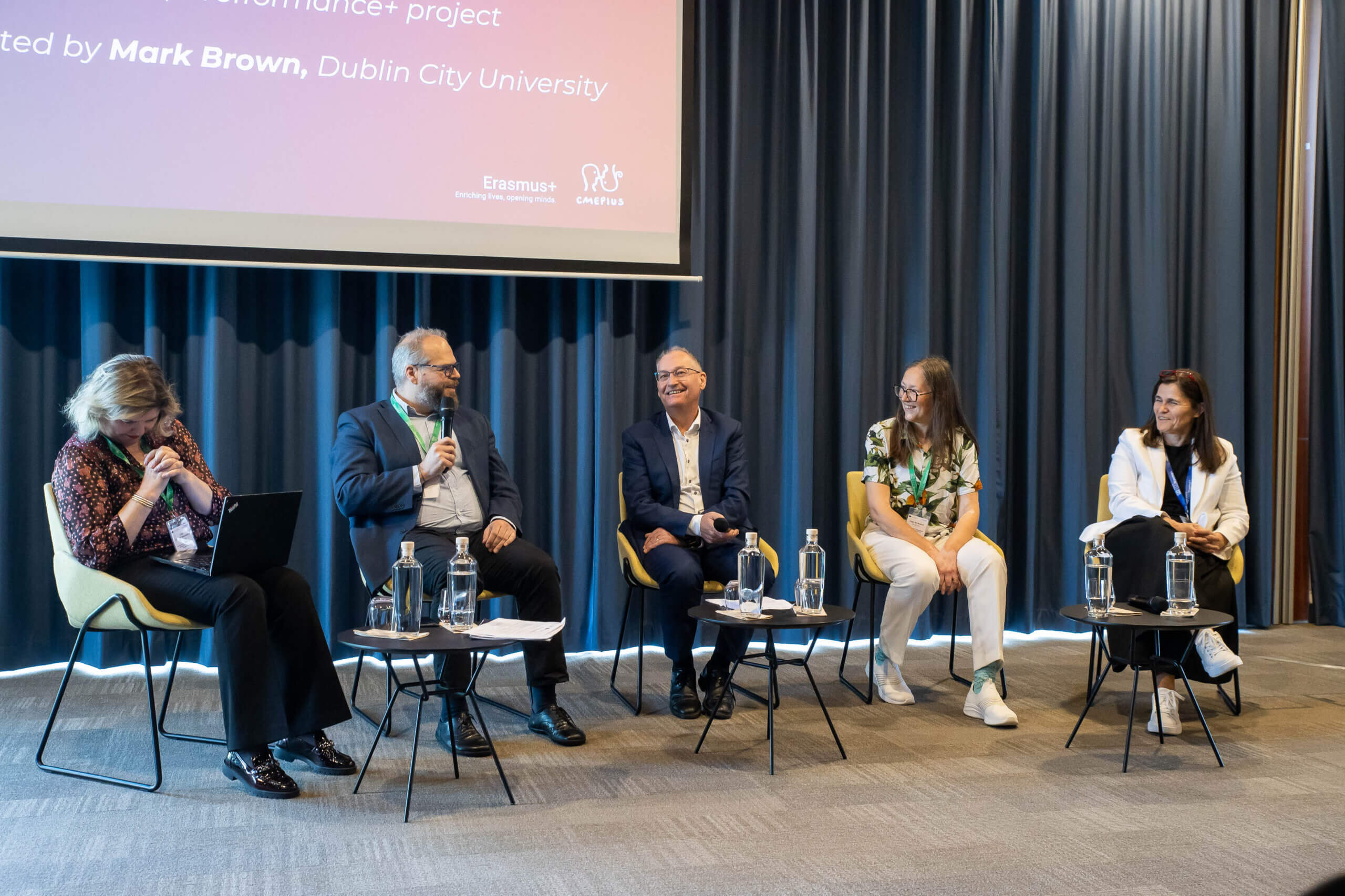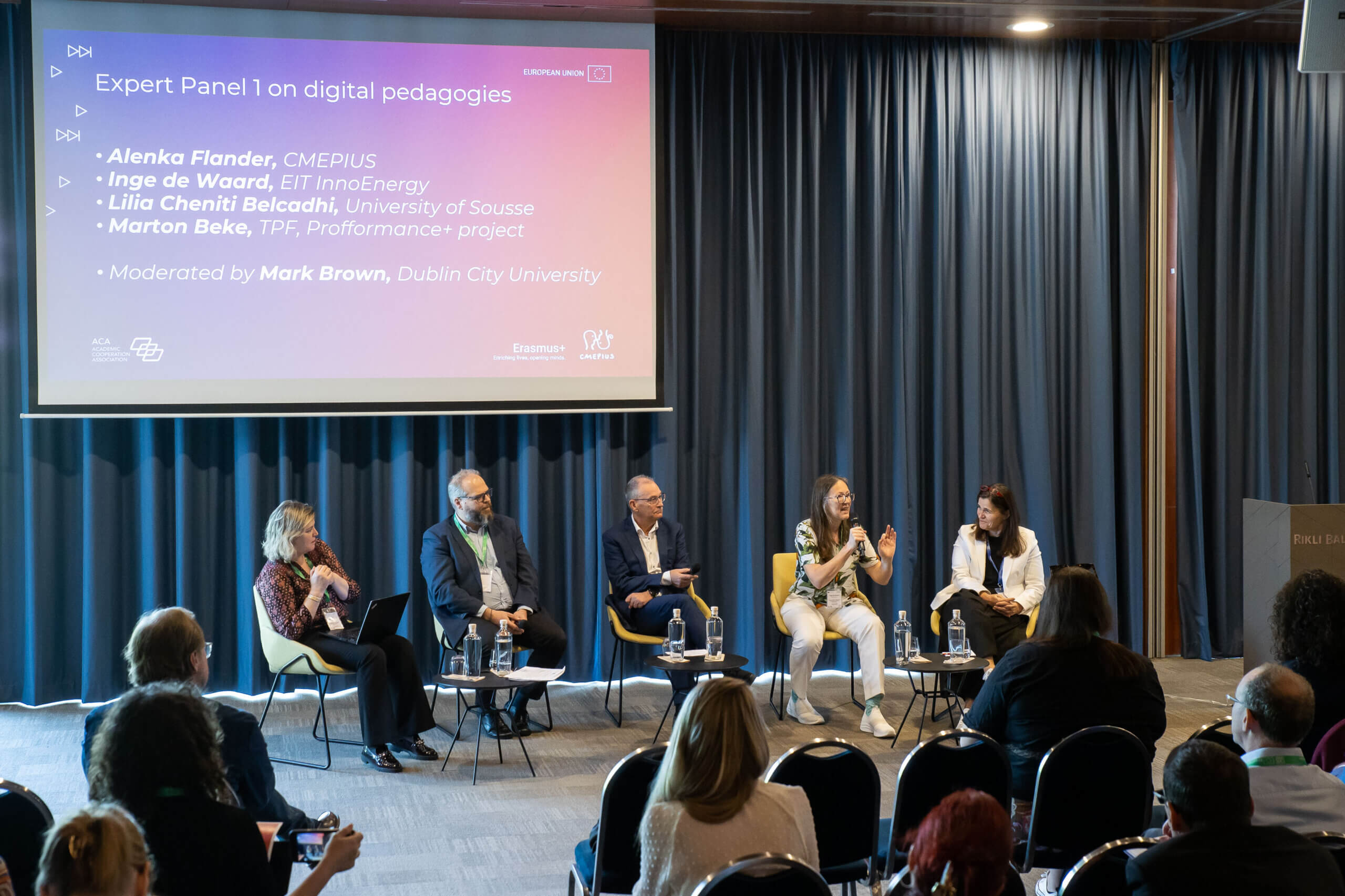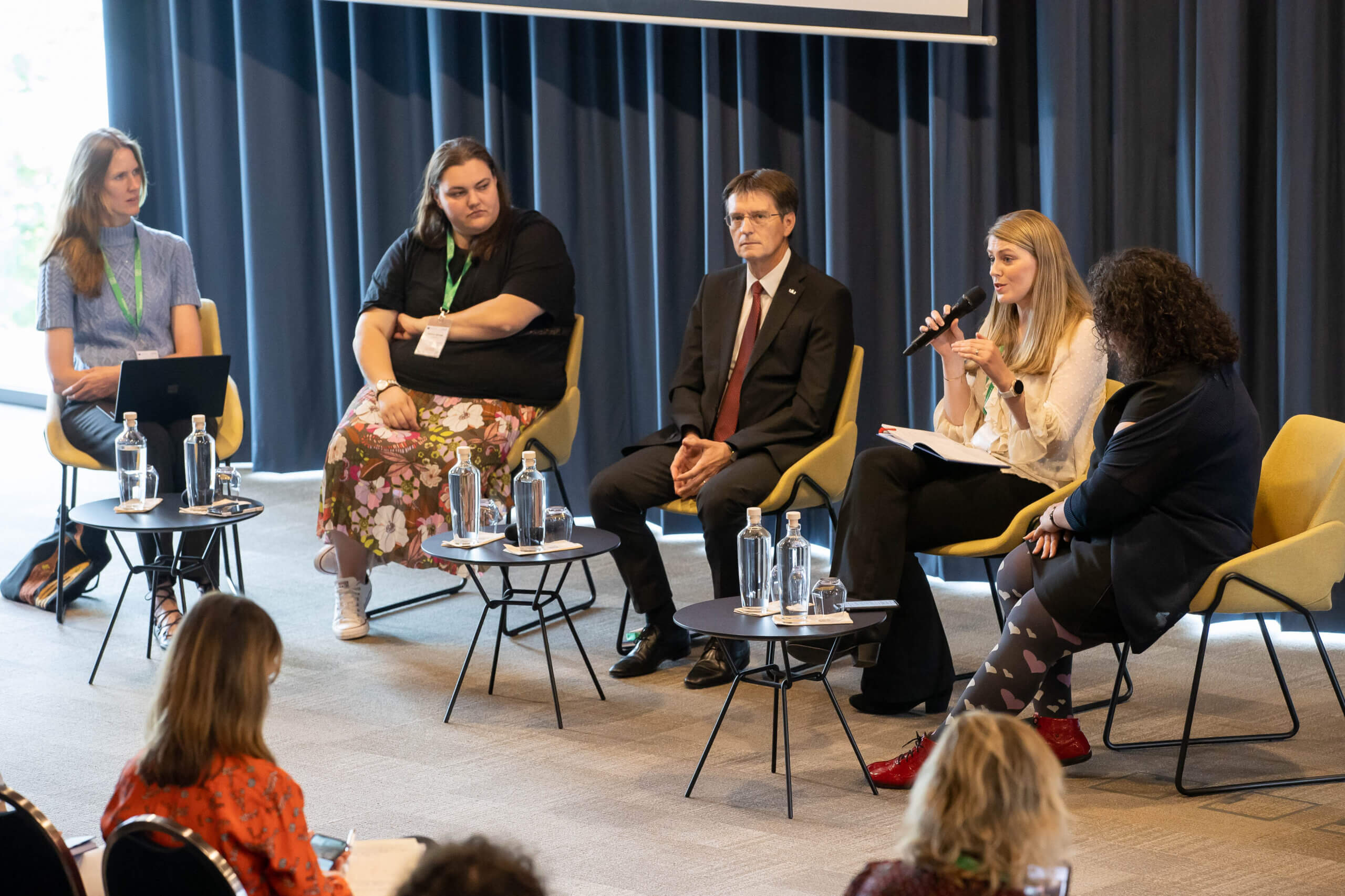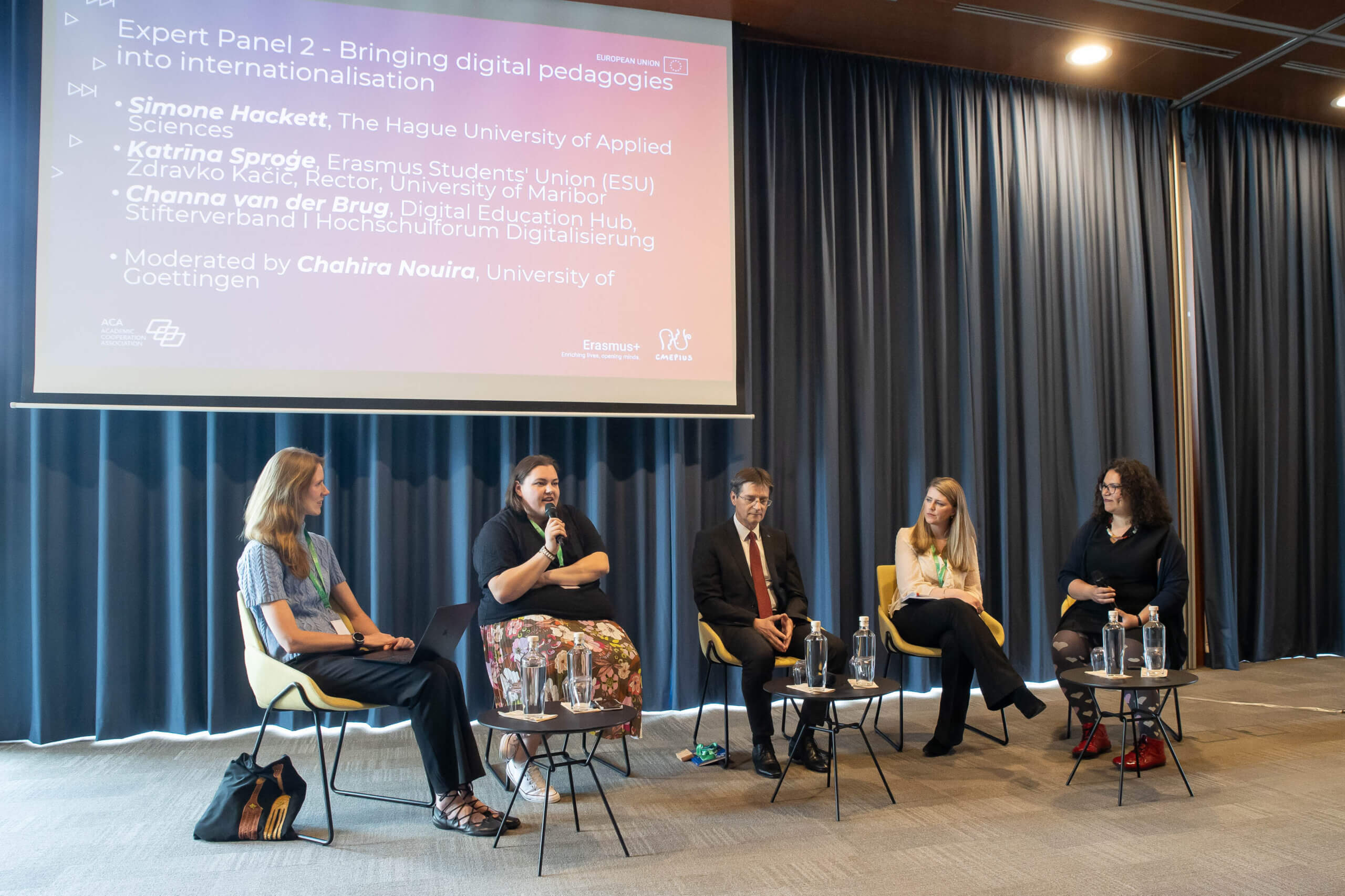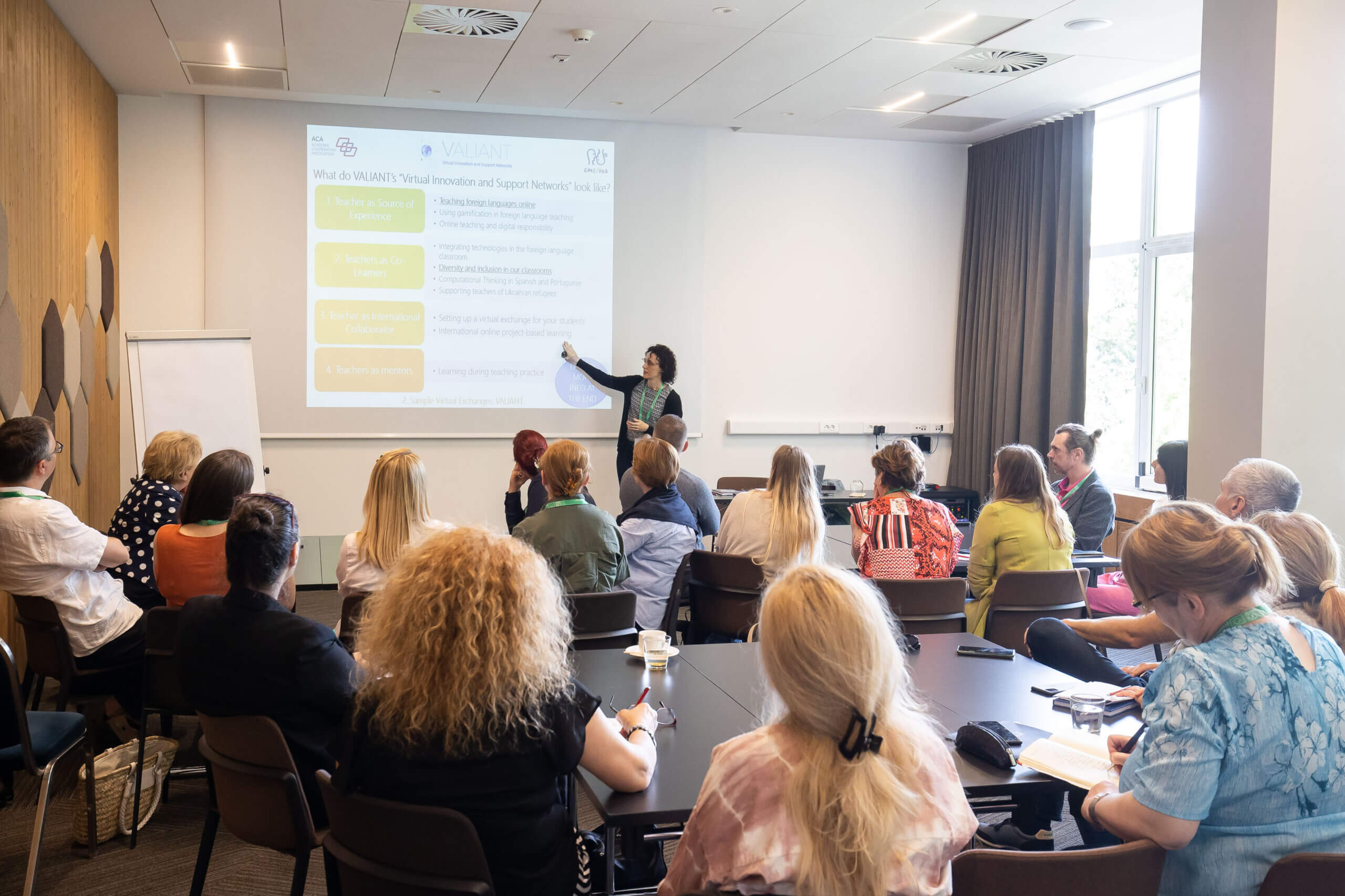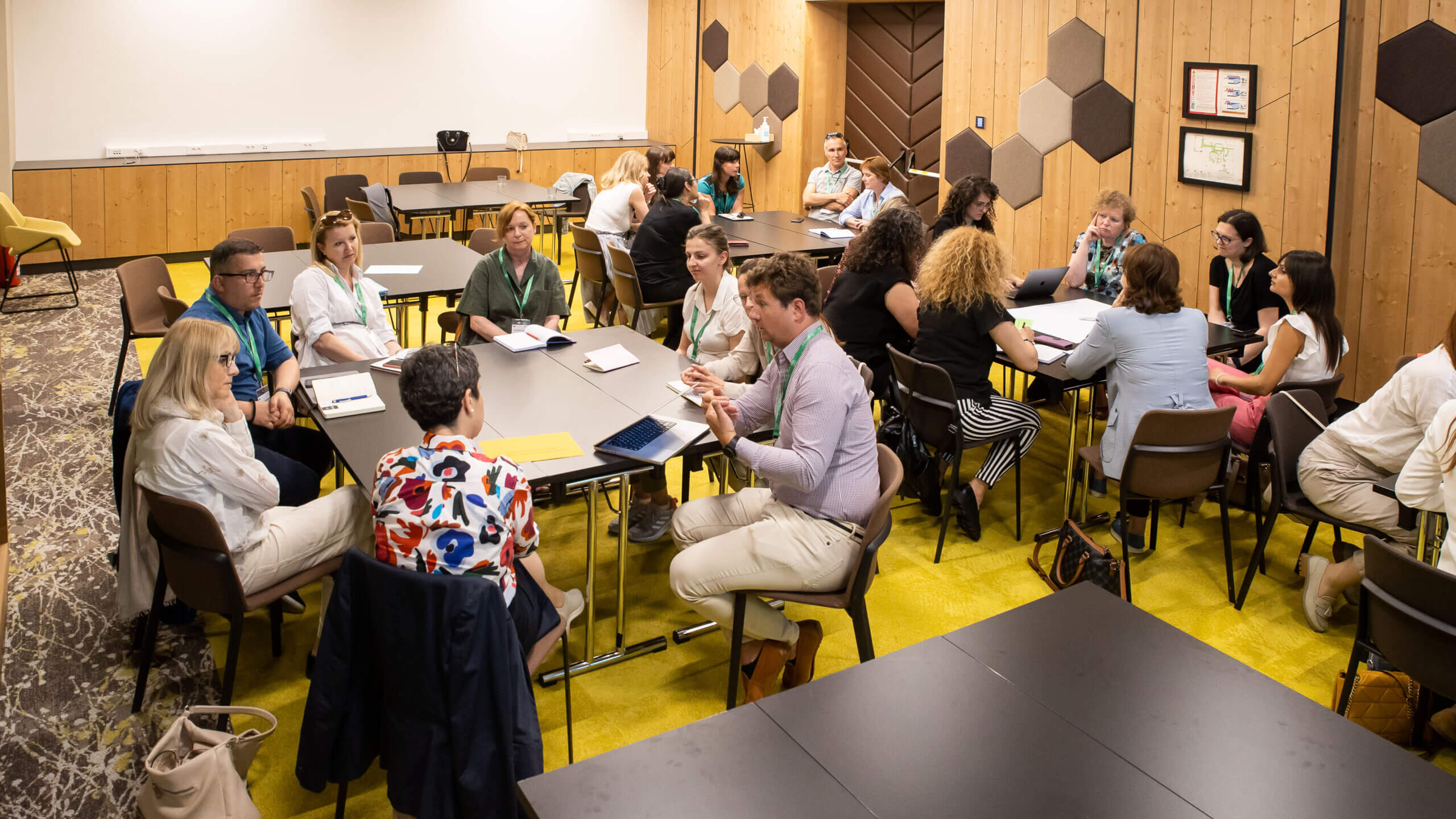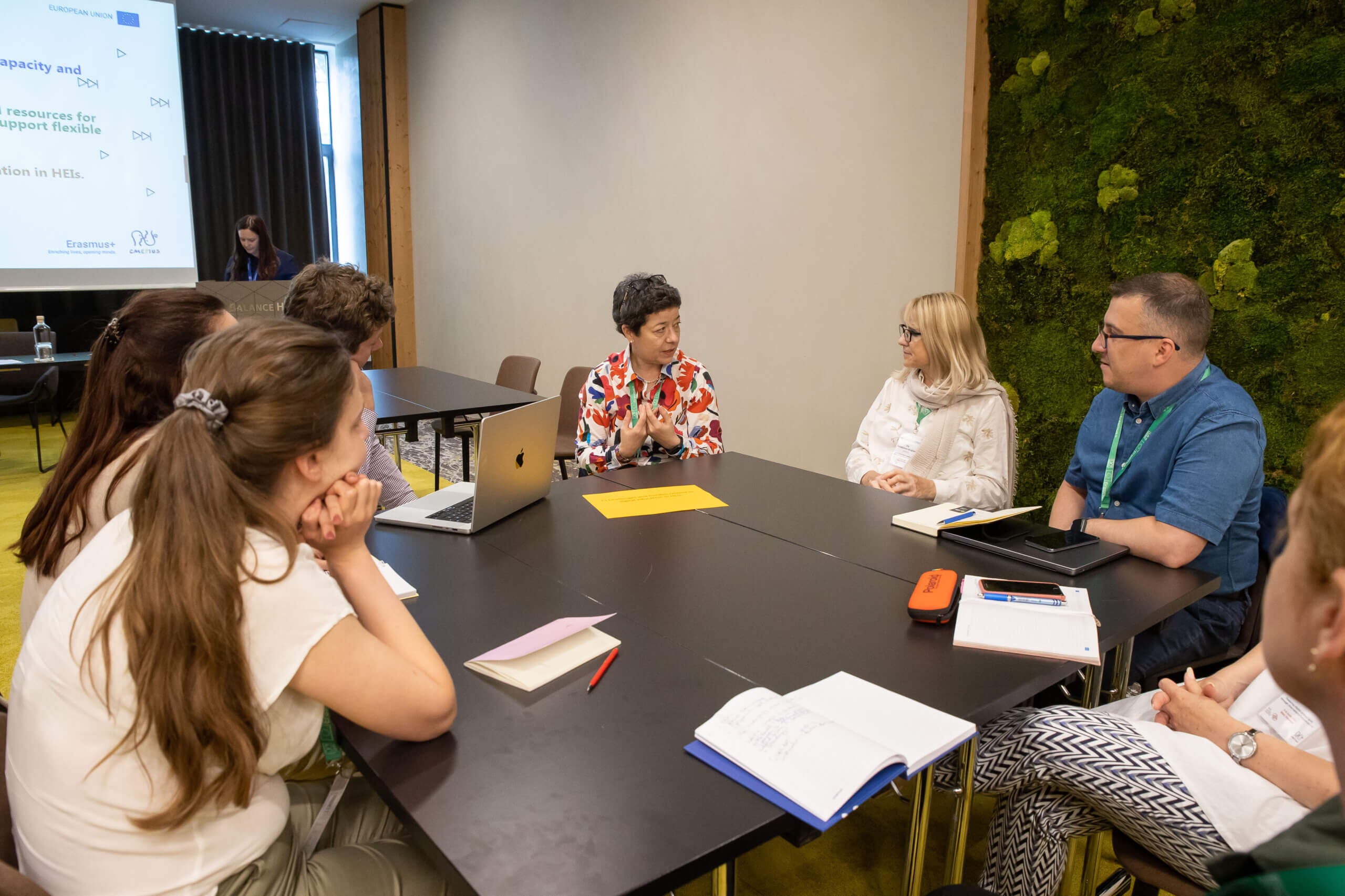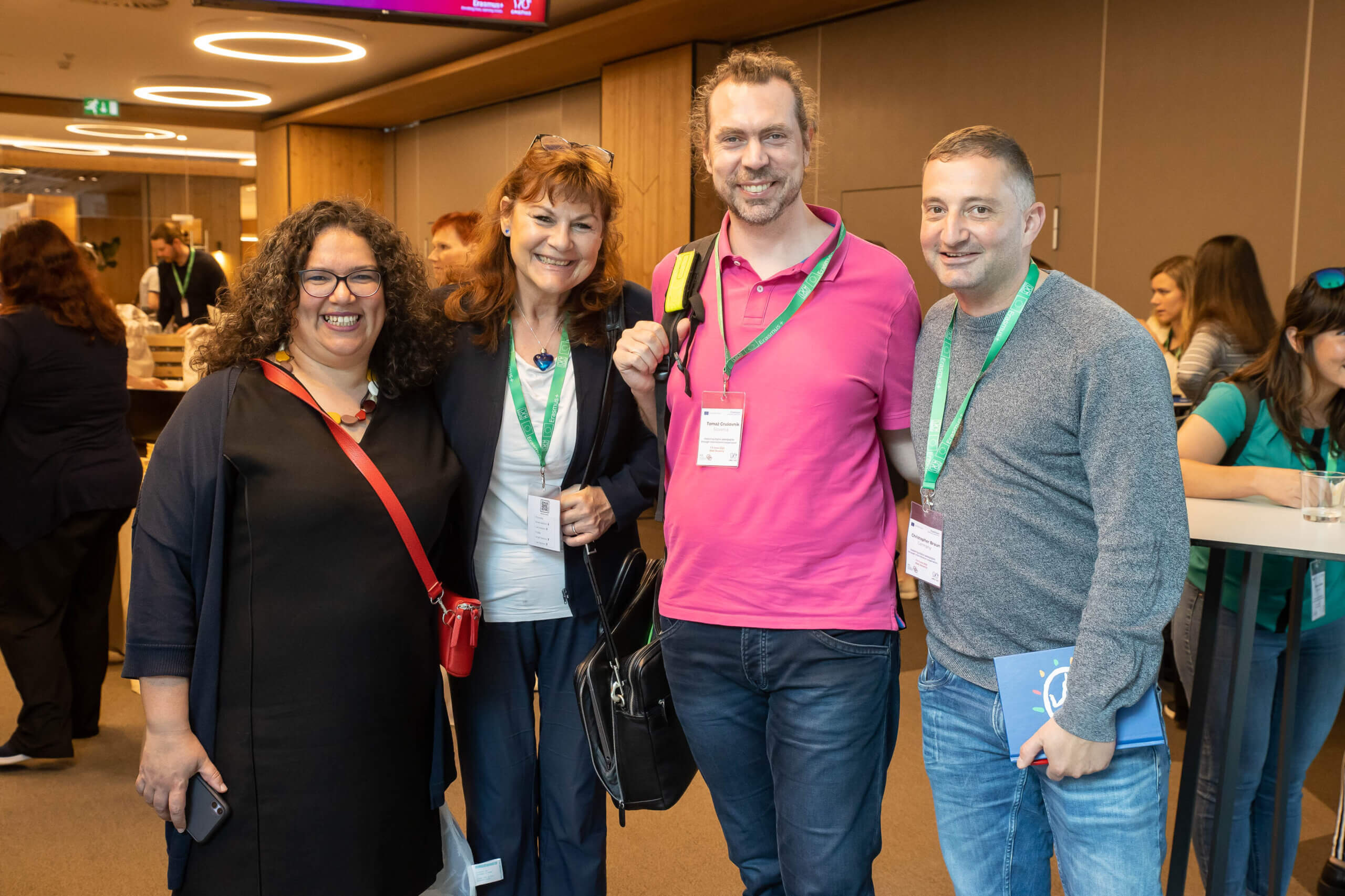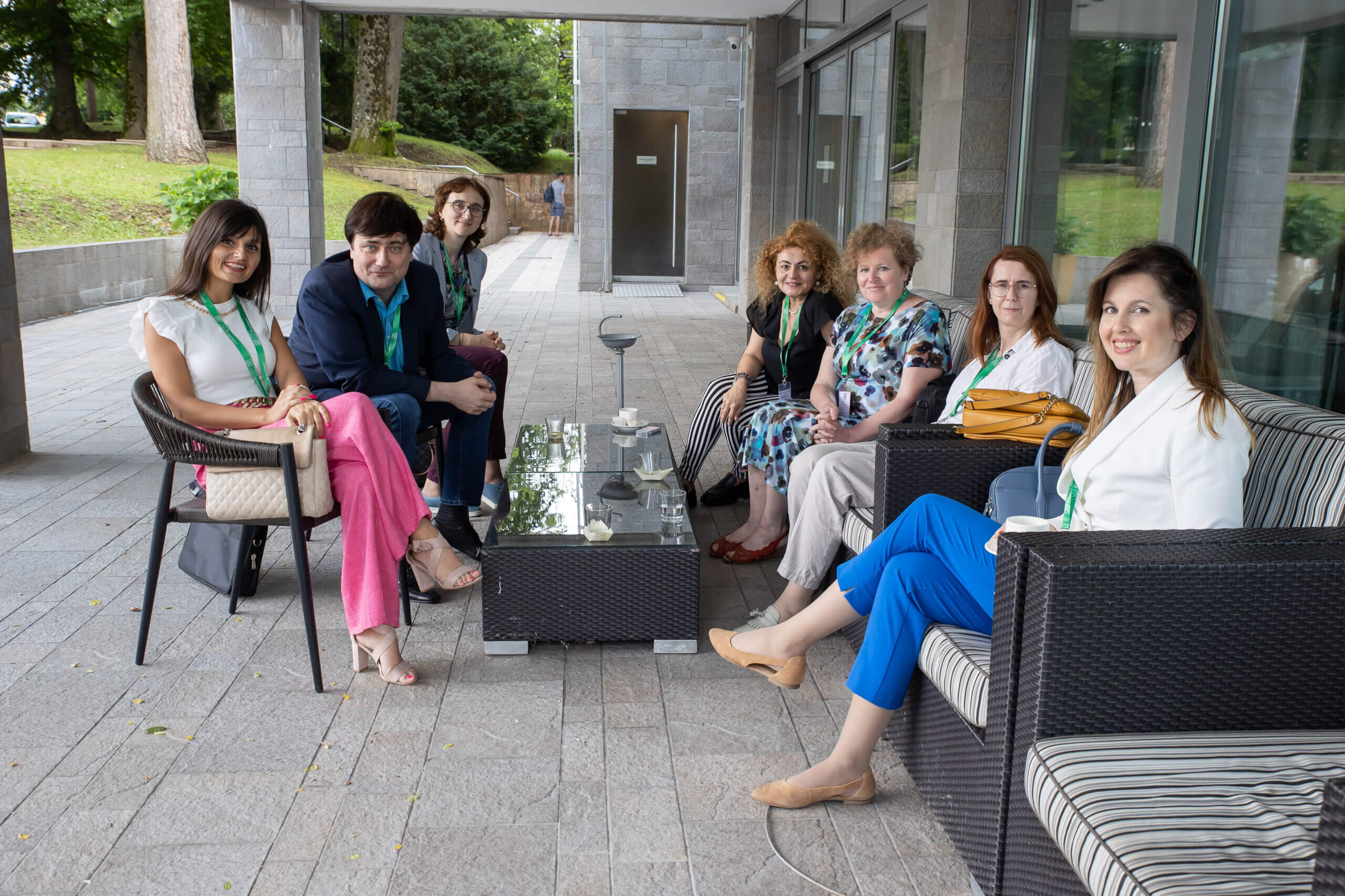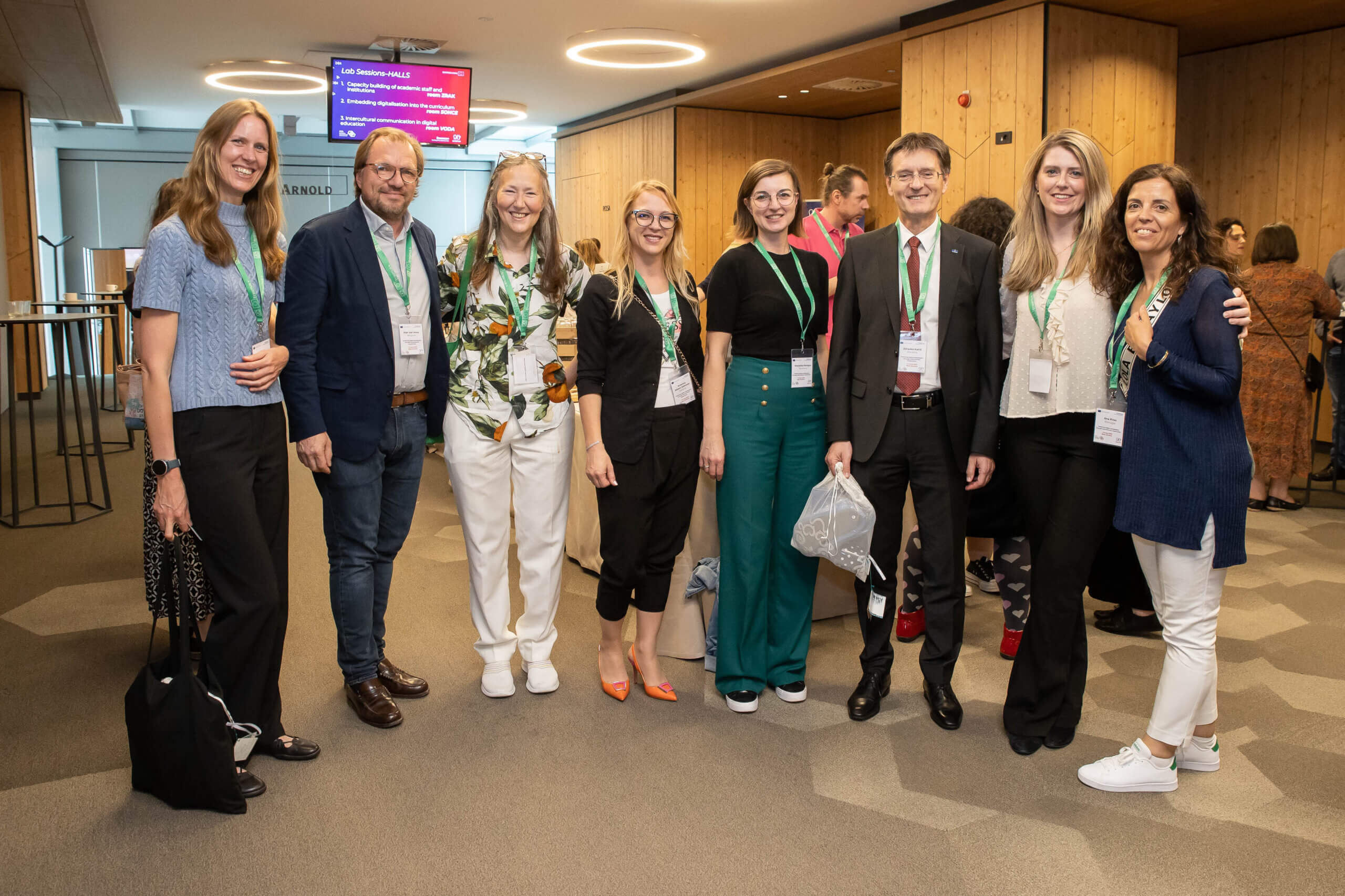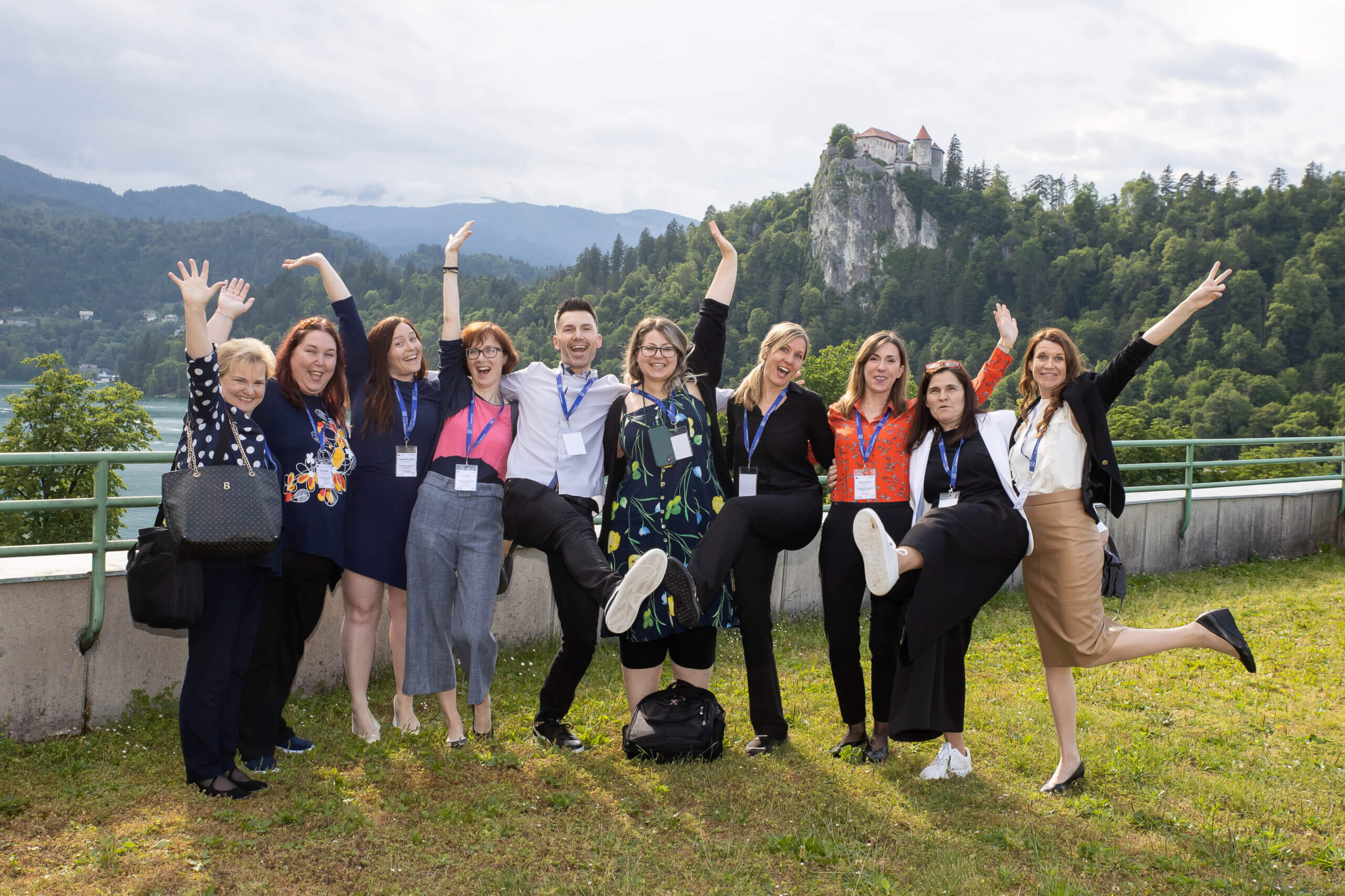Bled, Slovenia, 7 - 9 June 2023
Fostering digital pedagogies through international cooperation
Theme
Fostering digital pedagogies through international cooperation
7 - 9 June 2023 - Bled, Slovenia
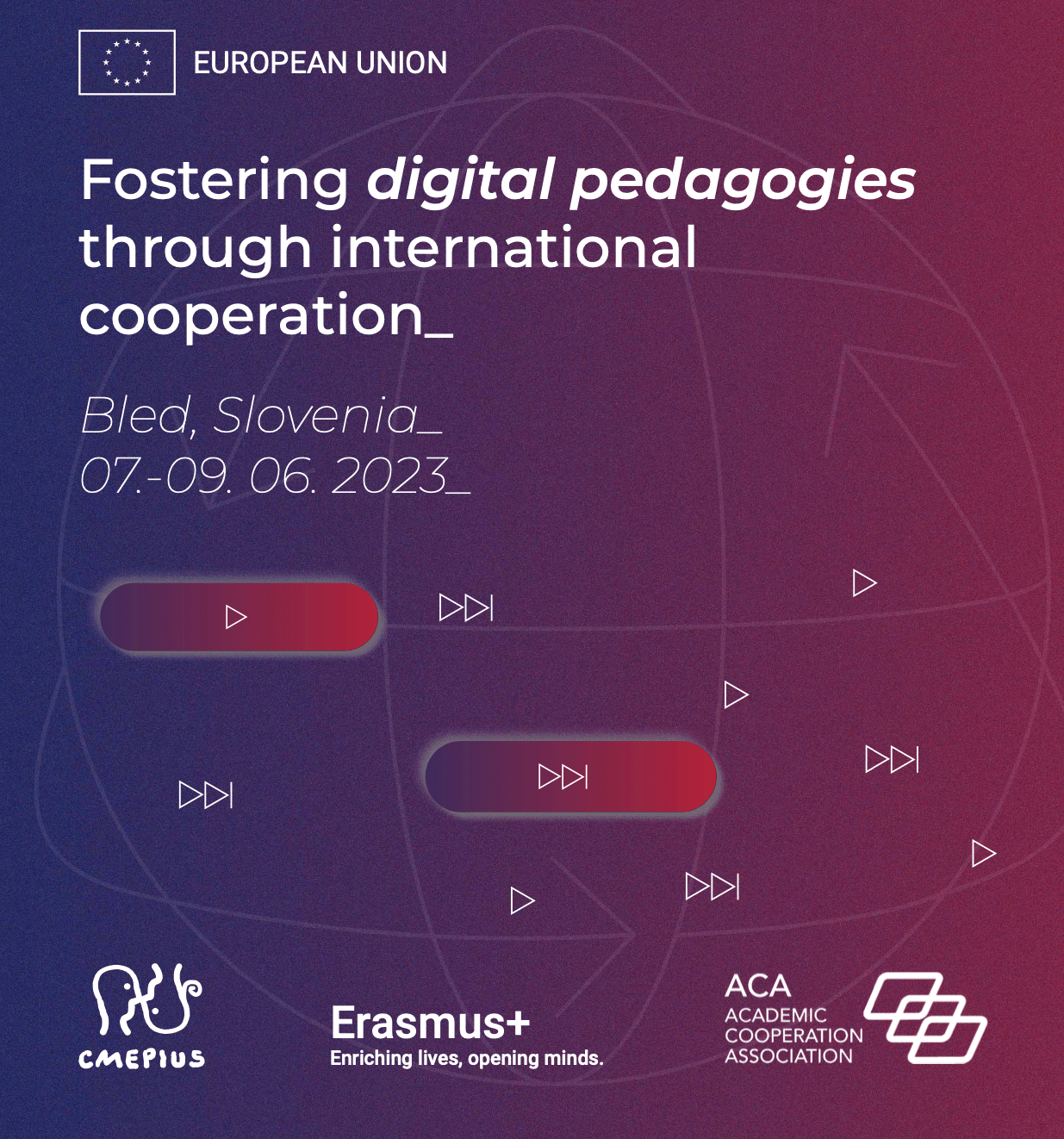 While there are many benefits to be gained from applying digitalisation tools and strategies to teaching and learning methods, progress is uneven and there is a need to improve practice in online methods, identify "success and quality characteristics" of pedagogical practices, and help enhance and inform delivery in the pursuit of a new educational paradigm.
While there are many benefits to be gained from applying digitalisation tools and strategies to teaching and learning methods, progress is uneven and there is a need to improve practice in online methods, identify "success and quality characteristics" of pedagogical practices, and help enhance and inform delivery in the pursuit of a new educational paradigm.
The focus of Fostering digital pedagogies through international cooperation will be on sharing experiences and best practices in the use of digital pedagogies to enhance international teaching and learning activities concerning student mobility and new mobility formats, COIL, joint programmes, etc.
The event will take place over two days, and includes expert panels with discussions guided by the relevant European and national policies and funding opportunities and best practices presentations, exploring methods used, discussing added value and relevant challenges. The conference will also provide dedicated space for lab sessions, giving participants the opportunity to exchange, start thinking and possibly co-develop new project ideas with facilitation offered by experts. Drawing on discussions, panels and best practice presentations, participants will explore the challenges but also the potential of recent innovations, in terms of advancing education and international cooperation.
This event is co-organised by the Academic Cooperation Association (ACA) and the Centre of the Republic of Slovenia for Mobility and European Educational and Training Programmes (CMEPIUS).
#Fostering_digital_pedagogies
Programme
Venue: Rikli Balance Hotel
Cankarjeva 4,
4260 Bled, Slovenija
7 June
18:00:Welcome Reception, Rikli Balance Hotel
Day 1: 8 June
Registration: 8.00 – 9.00
Follow the plenary sessions (excluding the small sessions and workshops):
Download the programme here.
Watch the welcome words, keynote and first panel here.
| 9:00 – 09:30 | Welcome words: Alenka Flander, Centre of the Republic of Slovenia for Mobility and European Educational and Training Programmes – CMEPIUS Igor Papič, Minister of Higher Education, Science and Innovation Irina Ferencz, Academic Cooperation Association – ACA Conference moderator: Piet Van Hove, EAIE *Livestreamed |
| 9:30 – 10:00 | Opening keynote: Robert O’Dowd, Full Professor for English Studies, University of León *Livestreamed |
| 10:00 – 11:15 | Panel: Digital Pedagogies
Panellists: Inge de Waard, EIT InnoEnergy Marton Beke, Tempus Public Foundation Lilia Cheniti Belcadhi, Higher Institute of Computer Sciences and Communication Technologies, University of Sousse Moderator: Mark Brown, Dublin City University *Livestreamed |
| 11:15 – 11:45 | Coffee break & Networking |
| 11.45 – 13.00 |
Small Sessions: Valiant Workshop & Good practice presentations – Round 1
|
| 13.00 – 14.30 | Lunch Break |
| 14.30– 15.30 | Panel: Bringing digital pedagogies into internationalisation
Panellists: Katrīna Sproģe, Erasmus Students’ Union (ESU) Zdravko Kačič, Rector, University of Maribor Channa van der Brug, Digital Education Hub, Stifterverband I Hochschulforum Digitalisierung Moderator: Chahira Nouira, University of Goettingen *Livestreamed |
| 15.30 – 16.00 |
Coffee break & Networking |
| 16.00 – 17.00 |
Lab sessions – 1st meeting
|
| 17.00 – 17.30 | Debriefing – Key takeaways: Piet Van Hove, EAIE |
| 19.00 | Dinner, Bled Rose Hotel |
| 9.00 – 10.15 |
Small Sessions: Valiant Workshop & Good practice presentations – Round 2
|
| 10.30 – 11.00 | Funding opportunities under Erasmus+ for digital pedagogies Anna Bielecka, Foundation for the Development of the Education System (FRSE) |
| 11.00 – 11.30 | Coffee break & Networking |
| 11.30 – 13:30 |
Lab sessions – 2nd meeting
|
| 13.30 – 14.00 | Key takeaways – Closing remarks: Piet Van Hove, EAIE |
| 14.00 | Lunch |
Speakers
Alenka Flander
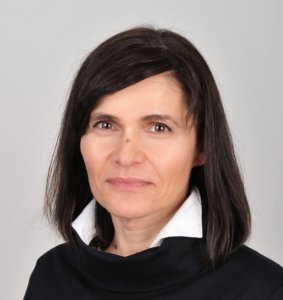 Alenka is the Director of ACA’s Slovene member organisation – the Centre of the Republic of Slovenia for Mobility and European Educational and Training Programmes (CMEPIUS), the leading Slovene institution in the field of internationalisation of education and training. In that capacity she is responsible for the implementation of EU programmes (Erasmus+) in Slovenia with a strong focus on achieving sustainable impact of the projects and programme and ensuring effective dissemination and integration of programme results into institutional and national systems and practices. Alenka was trained as an electrical engineer and completed her PhD in the Political Science. Her research work is interdisciplinary in nature and encompasses monitoring and measuring the impact of European programmes in the area of education and training, and research on internationalisation and higher education. She contributed to national and international expert groups (i.e. EUROSTUDENT, EAIE Task Force) and authored several publications and articles on internationalisation in higher education and the academic profession. In internationalisation, she was behind the preparation of Slovene Strategy for internationalisation of higher education adopted in 2016.
Alenka is the Director of ACA’s Slovene member organisation – the Centre of the Republic of Slovenia for Mobility and European Educational and Training Programmes (CMEPIUS), the leading Slovene institution in the field of internationalisation of education and training. In that capacity she is responsible for the implementation of EU programmes (Erasmus+) in Slovenia with a strong focus on achieving sustainable impact of the projects and programme and ensuring effective dissemination and integration of programme results into institutional and national systems and practices. Alenka was trained as an electrical engineer and completed her PhD in the Political Science. Her research work is interdisciplinary in nature and encompasses monitoring and measuring the impact of European programmes in the area of education and training, and research on internationalisation and higher education. She contributed to national and international expert groups (i.e. EUROSTUDENT, EAIE Task Force) and authored several publications and articles on internationalisation in higher education and the academic profession. In internationalisation, she was behind the preparation of Slovene Strategy for internationalisation of higher education adopted in 2016.
Robert O’Dowd
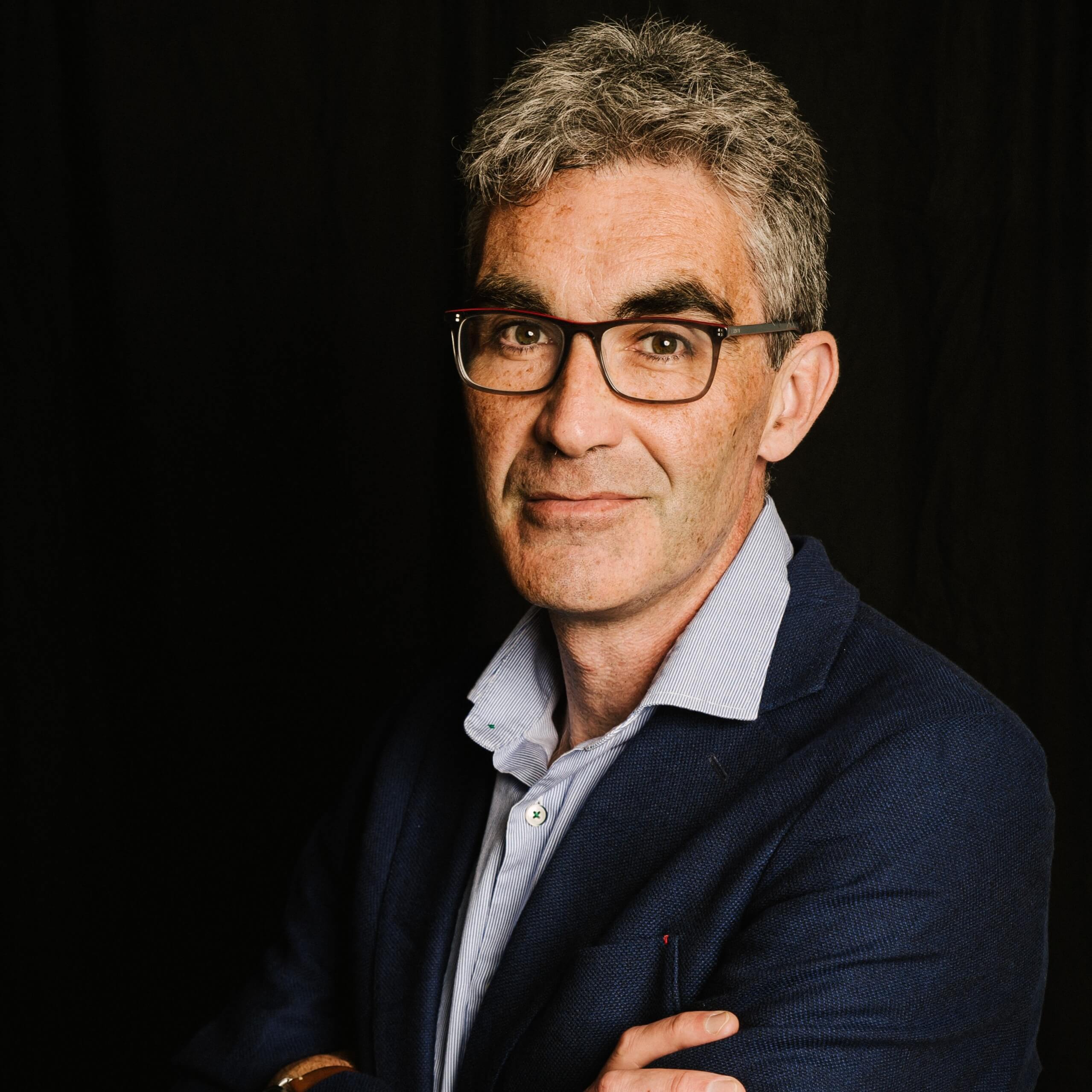 Robert O’Dowd is Full Professor for English Studies at the University of León, Spain. He has taught at universities in Ireland, Germany and Spain. He has published extensively on the application of Virtual Exchange in higher education and has been invited to be plenary speaker at international conferences in the US, Asia and across Europe. He is currently coordinating the Erasmus+ European Policy Experiment ‘Virtual Innovation and Support Networks for Teachers’ (VALIANT) and collaborates with organizations on the promotion and integration of Virtual Exchange in higher education across Europe. His most recent book is Internationalising Higher Education and the Role of Virtual Exchange (2023, Routledge).
Robert O’Dowd is Full Professor for English Studies at the University of León, Spain. He has taught at universities in Ireland, Germany and Spain. He has published extensively on the application of Virtual Exchange in higher education and has been invited to be plenary speaker at international conferences in the US, Asia and across Europe. He is currently coordinating the Erasmus+ European Policy Experiment ‘Virtual Innovation and Support Networks for Teachers’ (VALIANT) and collaborates with organizations on the promotion and integration of Virtual Exchange in higher education across Europe. His most recent book is Internationalising Higher Education and the Role of Virtual Exchange (2023, Routledge).
Piet Van Hove
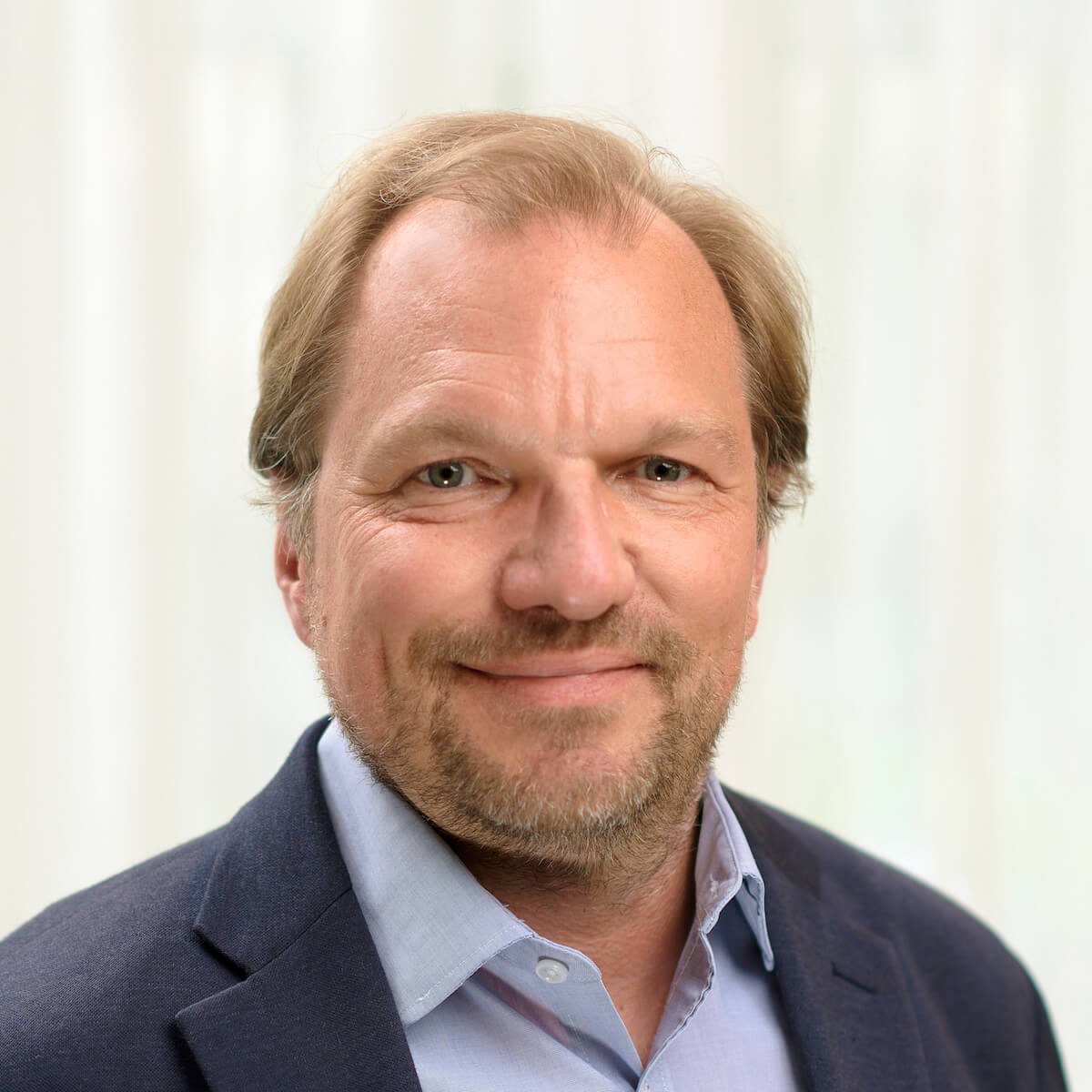
Piet Van Hove is President (2022-24) of the European Association for International Education (EAIE) and Senior Policy Advisor for Internationalisation at the University of Antwerp, where he previously studied Law. He has been active in internationalisation since 1995, dealing with university-wide policy formulation and execution on different aspects of internationalisation, including student and staff mobility, development cooperation, services for international staff and students, international educational projects and strategic networking. Piet has been active in the leadership of several professional associations and nonprofits at the national and international level for many years, such as Flanders Knowledge Area, ACA, the NGO APOPO and the EAIE. He presents frequently on a wide range of topics related to internationalisation of higher education.
Irina Ferencz
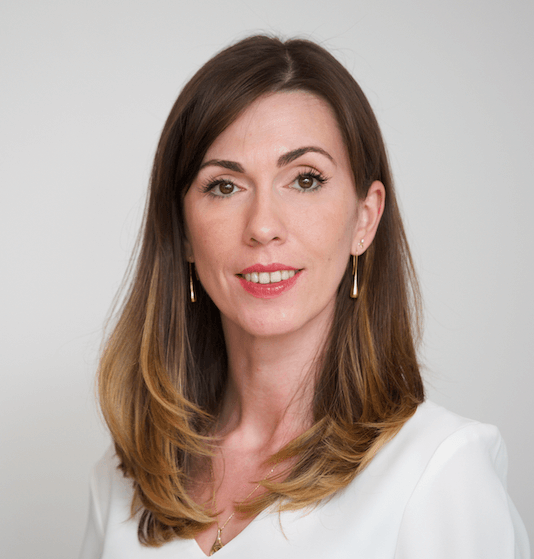
Irina Ferencz is the Director of ACA and has been working in international higher education since 2008. Irina has a specific expertise in the area of international student and staff mobility in the European context (data collections, trends, policies), as well as in planning, monitoring and assessing internationalisation activities at institutional and national level. She also has a growing interest in widening inclusion in internationalisation activities. Currently, she is also a PhD candidate at Ghent University, CHEGG, and an occasional reviewer for two higher education journals. She has authored and co-authored multiple publications in the field. Irina holds an MSc degree in European Politics and Policies (KULeuven, Belgium) and a Bachelor’s degree in International Relations and European Studies (Universitatea Babeş-Bolyai, Romania). She is a Romanian national, speaks several language and calls Belgium ‘home’.
Angeliki Psychogyiou
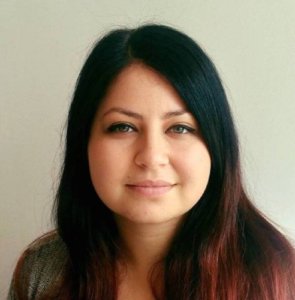 Angeliki Psychogyiou is a Policy and Project Officer at the Academic Cooperation Association, where her main focus is on digitalisation and sustainability in international higher education, conducting both project and policy related work. In the framework of overseeing the digital portfolio of ACA, she is the co-chair of ACA’s Thematic Peer Group “New Mobility Formats”, exploring the intersection between digitalisation and sustainability and discussing emerging trends and issues in new digitally enhanced mobility formats as well as their implications for programme design and the work of funding agencies. She is also the coordinator of the recently funded HIBLend project, aiming to raise interest in and enhance HEIs’ capacity to develop high-quality blended mobility opportunities for students. Angeliki has also been working in the private sector, in a complementary capacity, in evaluating EU funding applications in education and conducting research for EU studies (e.g., study on the implementation of the Council Recommendation on promoting automatic mutual recognition).
Angeliki Psychogyiou is a Policy and Project Officer at the Academic Cooperation Association, where her main focus is on digitalisation and sustainability in international higher education, conducting both project and policy related work. In the framework of overseeing the digital portfolio of ACA, she is the co-chair of ACA’s Thematic Peer Group “New Mobility Formats”, exploring the intersection between digitalisation and sustainability and discussing emerging trends and issues in new digitally enhanced mobility formats as well as their implications for programme design and the work of funding agencies. She is also the coordinator of the recently funded HIBLend project, aiming to raise interest in and enhance HEIs’ capacity to develop high-quality blended mobility opportunities for students. Angeliki has also been working in the private sector, in a complementary capacity, in evaluating EU funding applications in education and conducting research for EU studies (e.g., study on the implementation of the Council Recommendation on promoting automatic mutual recognition).
Božidar Grigić
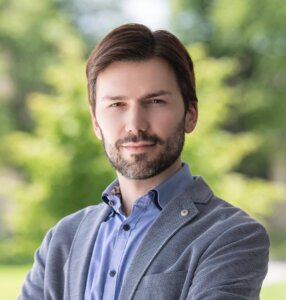 Božidar Grigić has been working in Higher Education field since 2011, firstly on institutional level as a researcher at University and since 2014 as coordinator of different international financial mechanisms on national level at CMEPIUS, Slovenian Erasmus+ national agency. In the last two years he has strategically lead and coordinated all activities in area of higher education as head of the unit. He is also active member of international Erasmus+ working group working closely with European Commission and other national agencies. Through those years he has moderated numerous workshops and monthly delivered presentations on different topics in HE area at national and international events.
Božidar Grigić has been working in Higher Education field since 2011, firstly on institutional level as a researcher at University and since 2014 as coordinator of different international financial mechanisms on national level at CMEPIUS, Slovenian Erasmus+ national agency. In the last two years he has strategically lead and coordinated all activities in area of higher education as head of the unit. He is also active member of international Erasmus+ working group working closely with European Commission and other national agencies. Through those years he has moderated numerous workshops and monthly delivered presentations on different topics in HE area at national and international events.
Chahira Nouira
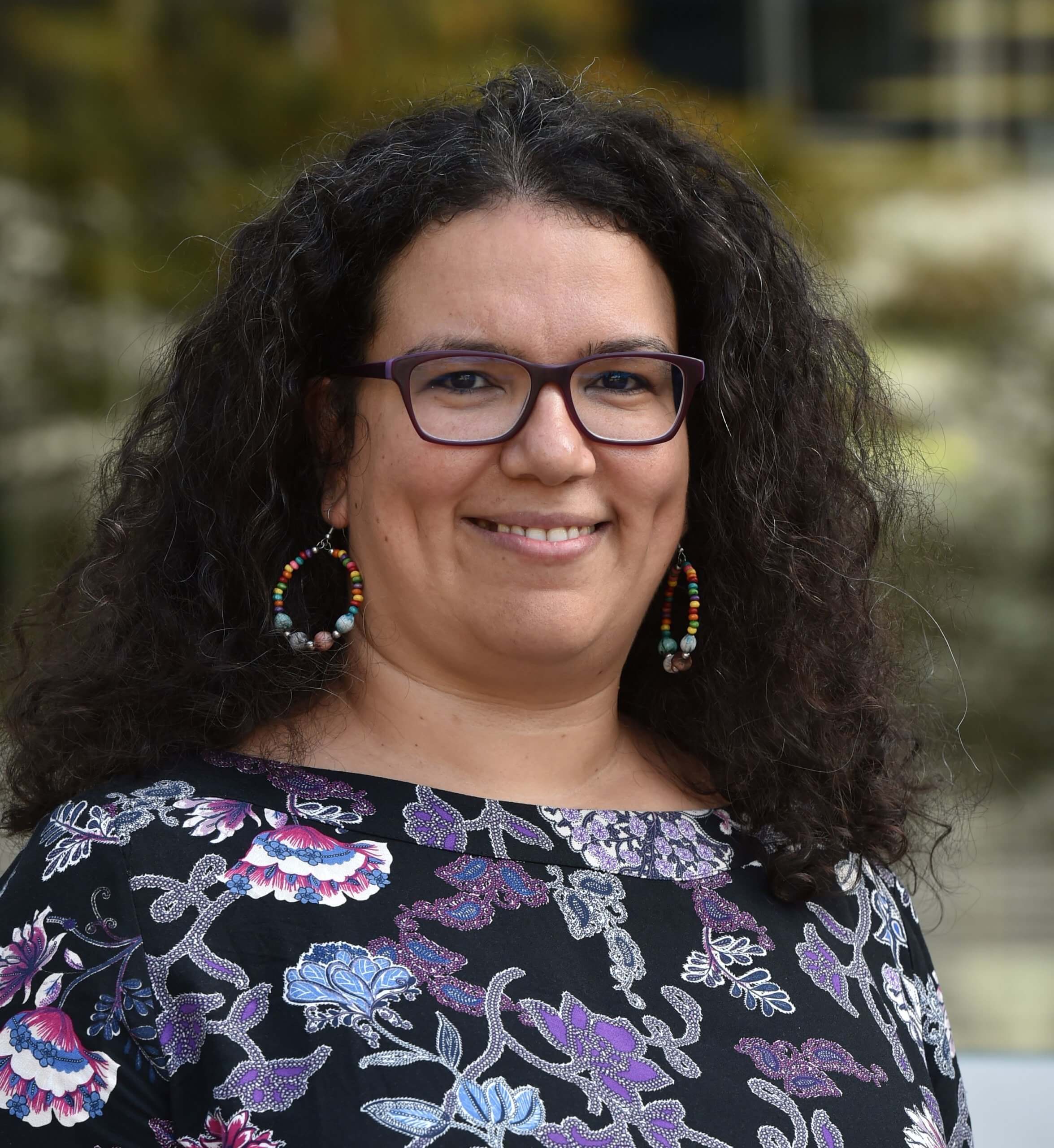
Chahira Nouira is currently working at the University of Göttingen, Germany as an Instructional Designer. Almost 15 years ago, Chahira has started her career as an educational technologist. While working at the United Nations University (UNU), she contributed to a few European projects about Open Educational Resources for European Universities and Virtual Mobility. The focus of her work is the development and implementation of methods and tools that help teachers and students strengthen their digital competences and enhance collaborative teaching and learning. Since December 2016, Chahira has been a member of the Digital Learning and Teaching team at the University of Göttingen. She first worked for the “Internationalisation of the Curricula” project and helped with the successful implementation of more than 30 digital and collaborative teaching initiatives. Since April 2020, she has been in charge of Digital Teaching and Learning in the DAAD funded IMKD project ´liveSciences³`
Inge de Waard
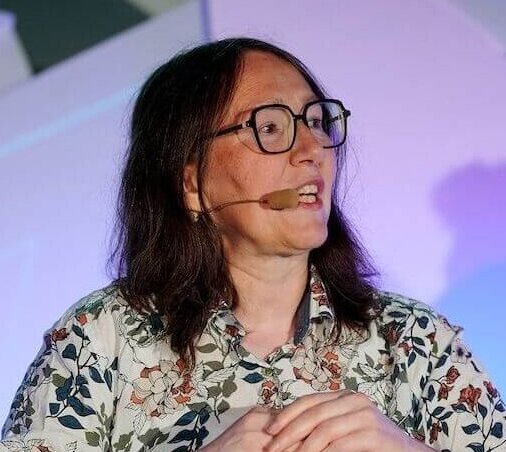 Inge de Waard is the learning strategist at EIT InnoEnergy. Inge is a longtime researcher, activist, award-winning learning innovator and (e)Learning coordinator. She developed multiple online & hybrid courses, co-designed AI tools, and embedded learning innovations. Inge coaches and co-creates international, blended curricula with engineers and teachers, and explores innovative learning formats. Her expertise is recognized by peers, resulting in additional co-authored papers, invited talks and keynotes in both academic as well as professional conferences, workshops and seminars. She recently founded the Flamboyant Grays initiative to spotlight role models who changed their lives at any age beyond 50 (FlamboyantGrays.com). Most of all, she likes to connect with people and share stories.
Inge de Waard is the learning strategist at EIT InnoEnergy. Inge is a longtime researcher, activist, award-winning learning innovator and (e)Learning coordinator. She developed multiple online & hybrid courses, co-designed AI tools, and embedded learning innovations. Inge coaches and co-creates international, blended curricula with engineers and teachers, and explores innovative learning formats. Her expertise is recognized by peers, resulting in additional co-authored papers, invited talks and keynotes in both academic as well as professional conferences, workshops and seminars. She recently founded the Flamboyant Grays initiative to spotlight role models who changed their lives at any age beyond 50 (FlamboyantGrays.com). Most of all, she likes to connect with people and share stories.
Márton Beke
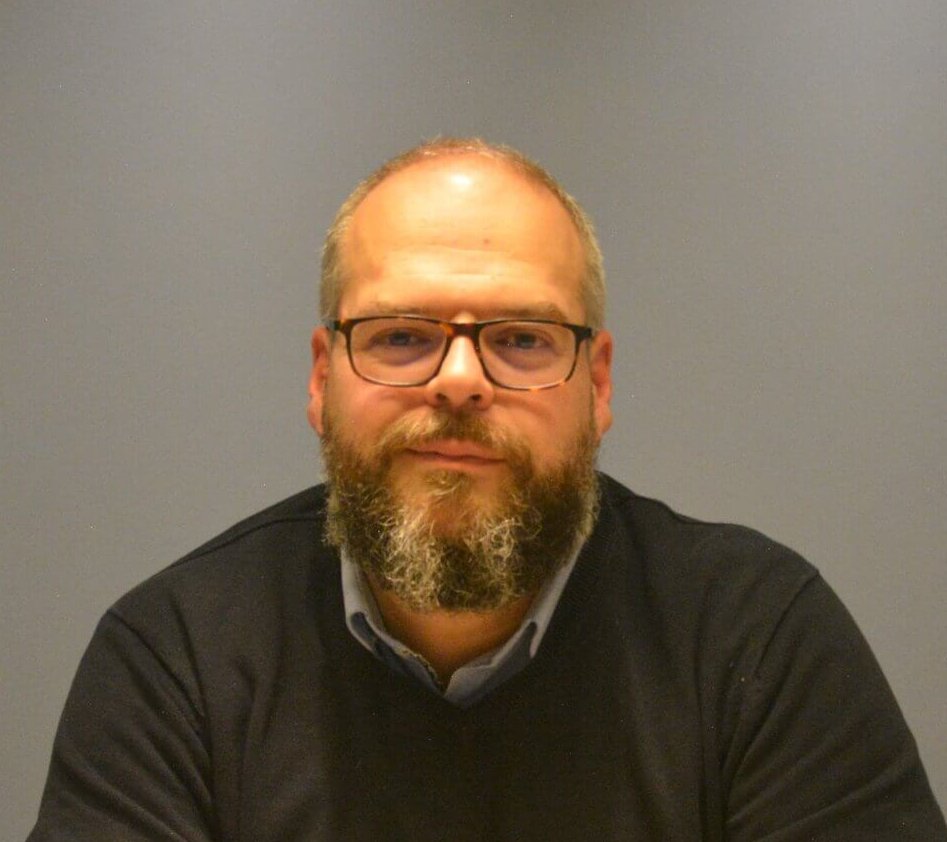 Márton Beke is currently Deputy Director at the Directorate for the Internationalisation of Higher Education at Tempus Public Foundation (TPF). He has been working for TPF since 2012 and has been involved in several European projects and was coordinator of the ECCE Mundus (Enhancing Cross-regional Cooperation in Erasmus Mundus) initiative that promoted joint degrees and cooperation in Central and Eastern Europe, the Western Balkans and Central Asia. He is currently responsible for the Erasmus+ Centralised Actions the CEEPUS programme, Bilateral state scholarships and the European Higher Education Area reforms projects. The current PROFFORMANCE+ project aims at developing an assessment tool and incentive systems for higher education teachers and to enhance their competences among others in the field of digitalisation.
Márton Beke is currently Deputy Director at the Directorate for the Internationalisation of Higher Education at Tempus Public Foundation (TPF). He has been working for TPF since 2012 and has been involved in several European projects and was coordinator of the ECCE Mundus (Enhancing Cross-regional Cooperation in Erasmus Mundus) initiative that promoted joint degrees and cooperation in Central and Eastern Europe, the Western Balkans and Central Asia. He is currently responsible for the Erasmus+ Centralised Actions the CEEPUS programme, Bilateral state scholarships and the European Higher Education Area reforms projects. The current PROFFORMANCE+ project aims at developing an assessment tool and incentive systems for higher education teachers and to enhance their competences among others in the field of digitalisation.
Lilia Cheniti Belcadhi
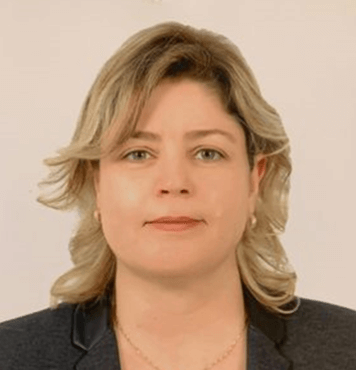 Dr Lilia Cheniti Belchadhi is an associate professor and Researcher of Computer Sciences at the Higher Institute of Computer Sciences and Communication Technologies, University of Sousse, Tunisia. She is currently the coordinator of the Pedagogical Innovation and Digital Learning Unit, and has previously led the online learning department. She is associated as an e-Learning Expert and Facilitator with international organizations (AUF, ILO, GIZ, ICESCO, etc.), and has been recently selected as member of international scientific council of AUF and president of AUF North Africa committee of scientific experts. She is involved, as part of her ongoing research, in several e-learning projects and has co-authored various online courses. She is a co-author of the first Computer Sciences MOOC in Computer Sciences in Tunisia, hosted by FUN (France Université Numérique). Lilia is a graduate of the University of Braunschweig, Germany.
Dr Lilia Cheniti Belchadhi is an associate professor and Researcher of Computer Sciences at the Higher Institute of Computer Sciences and Communication Technologies, University of Sousse, Tunisia. She is currently the coordinator of the Pedagogical Innovation and Digital Learning Unit, and has previously led the online learning department. She is associated as an e-Learning Expert and Facilitator with international organizations (AUF, ILO, GIZ, ICESCO, etc.), and has been recently selected as member of international scientific council of AUF and president of AUF North Africa committee of scientific experts. She is involved, as part of her ongoing research, in several e-learning projects and has co-authored various online courses. She is a co-author of the first Computer Sciences MOOC in Computer Sciences in Tunisia, hosted by FUN (France Université Numérique). Lilia is a graduate of the University of Braunschweig, Germany.
Katarina Sproge
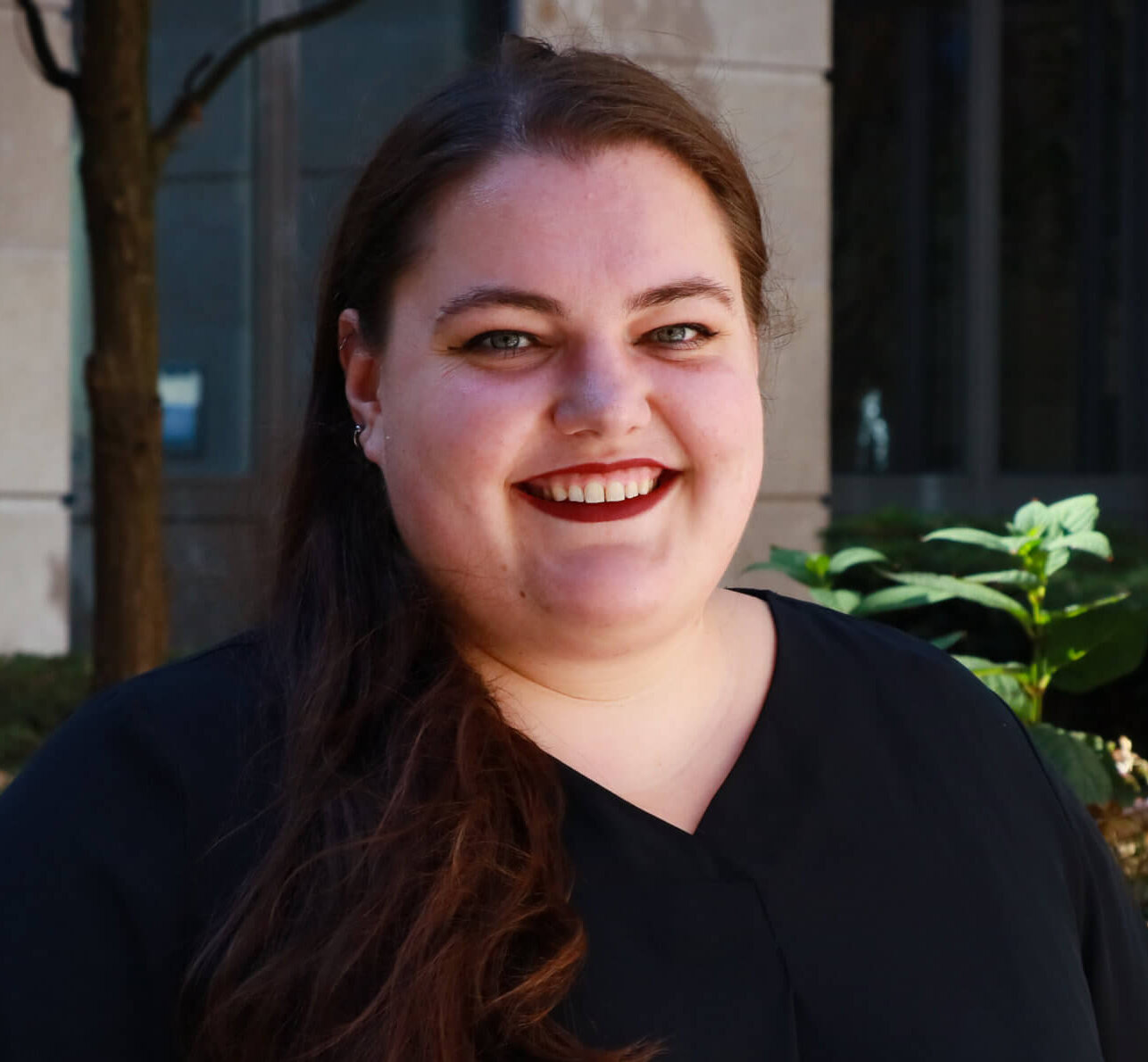 Katrina Sproge is the Vice President of Erasmus Students’ Union (ESU). She is originally from Latvia, and since 2014, she has been active in student representation on all levels, including local, national, and international ones. She was a member of the executive board of the Student Union of Latvia (LSA) from 2018 until 2021, during which time she held the positions of president and officer for international affairs. As Vice-President of ESU, Katrina is working on Internationalisation and Mobility in Higher Education, Global cooperation, Sustainability, Social dimension and inclusion, as well as organisational development and capacity building.
Katrina Sproge is the Vice President of Erasmus Students’ Union (ESU). She is originally from Latvia, and since 2014, she has been active in student representation on all levels, including local, national, and international ones. She was a member of the executive board of the Student Union of Latvia (LSA) from 2018 until 2021, during which time she held the positions of president and officer for international affairs. As Vice-President of ESU, Katrina is working on Internationalisation and Mobility in Higher Education, Global cooperation, Sustainability, Social dimension and inclusion, as well as organisational development and capacity building.
Simone Hackett
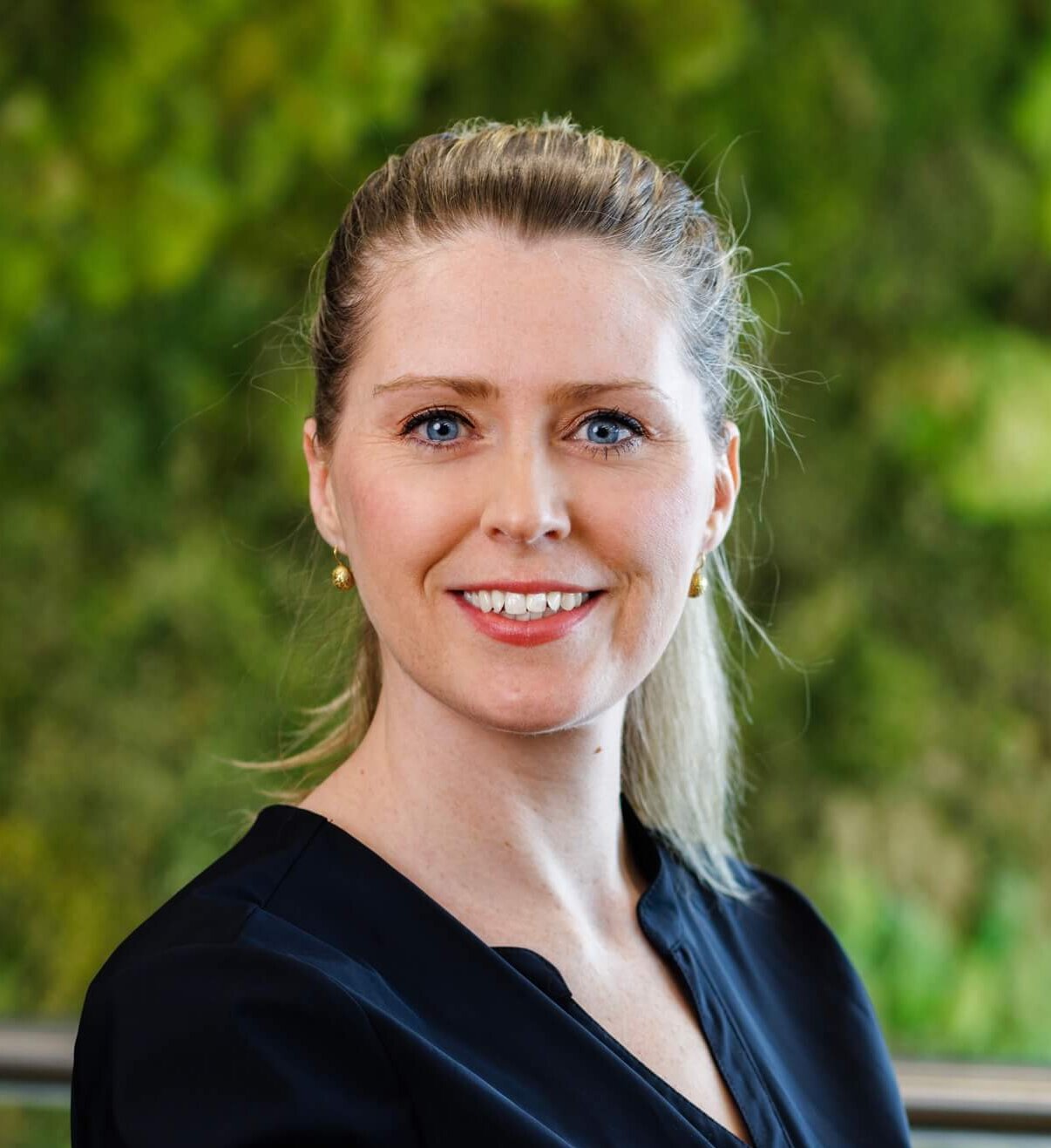 Simone Hackett is a Senior Lecturer and Researcher (Sociology & Education) at The Hague University of Applied Sciences and Utrecht University, The Netherlands. She has been active in the field of Internationalisation of Education since 2007, as an educator, researcher and faculty head of internationalisation. She is one of the leading experts in Collaborative Online International Learning (COIL). Since 2012 she has been designing and teaching COIL courses and conducts experimental research using control conditions to test the effectiveness of COIL. She is also a member of the General Council of the European Association of International Education (EAIE) and she regularly publishes articles on Internationalisation of Education and presents (inter)nationally on topics related to Internationalisation and COIL.
Simone Hackett is a Senior Lecturer and Researcher (Sociology & Education) at The Hague University of Applied Sciences and Utrecht University, The Netherlands. She has been active in the field of Internationalisation of Education since 2007, as an educator, researcher and faculty head of internationalisation. She is one of the leading experts in Collaborative Online International Learning (COIL). Since 2012 she has been designing and teaching COIL courses and conducts experimental research using control conditions to test the effectiveness of COIL. She is also a member of the General Council of the European Association of International Education (EAIE) and she regularly publishes articles on Internationalisation of Education and presents (inter)nationally on topics related to Internationalisation and COIL.
Mark Brown
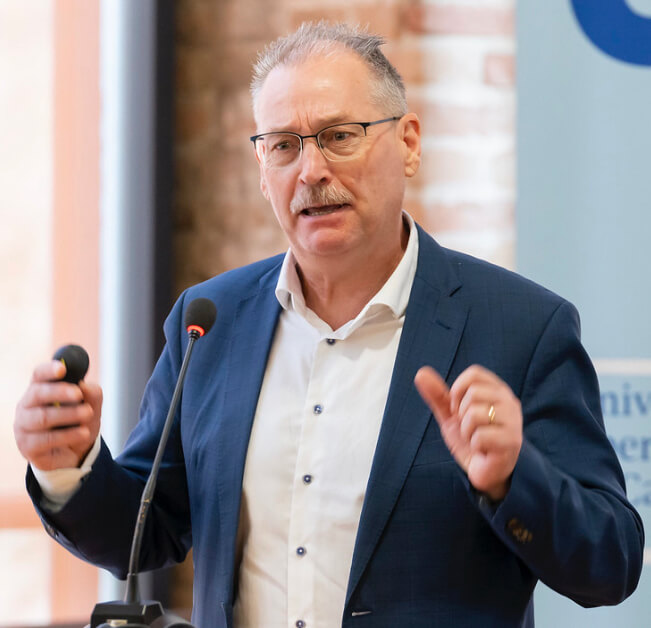 Professor Mark Brown is Ireland’s first Chair of Digital Learning and Director of the National Institute for Digital Learning (NIDL) at Dublin City University, Ireland. Mark is a Vice-President of EDEN Digital Learning Europe and is also a EDEN Senior Fellow. Additionally, Mark serves on the Supervisory Board of the European Association of Distance Teaching Universities (EADTU). Originally from New Zealand, the Commonwealth of Learning recognised Mark in 2017 as a world leader in the fields of Open, Distance and Digital Education. In 2019, Mark was Chair of the ICDE World Conference on Online Learning in Dublin. Professor Brown has a strong interest in lifelong learning and was a member of the European Commission’s Higher Education Consultation Group on developing a EU-wide approach to micro-credentials. He continues to influence micro-credential policy developments through several initiatives, with most recently a report for OECD.
Professor Mark Brown is Ireland’s first Chair of Digital Learning and Director of the National Institute for Digital Learning (NIDL) at Dublin City University, Ireland. Mark is a Vice-President of EDEN Digital Learning Europe and is also a EDEN Senior Fellow. Additionally, Mark serves on the Supervisory Board of the European Association of Distance Teaching Universities (EADTU). Originally from New Zealand, the Commonwealth of Learning recognised Mark in 2017 as a world leader in the fields of Open, Distance and Digital Education. In 2019, Mark was Chair of the ICDE World Conference on Online Learning in Dublin. Professor Brown has a strong interest in lifelong learning and was a member of the European Commission’s Higher Education Consultation Group on developing a EU-wide approach to micro-credentials. He continues to influence micro-credential policy developments through several initiatives, with most recently a report for OECD.
Carina Ginty
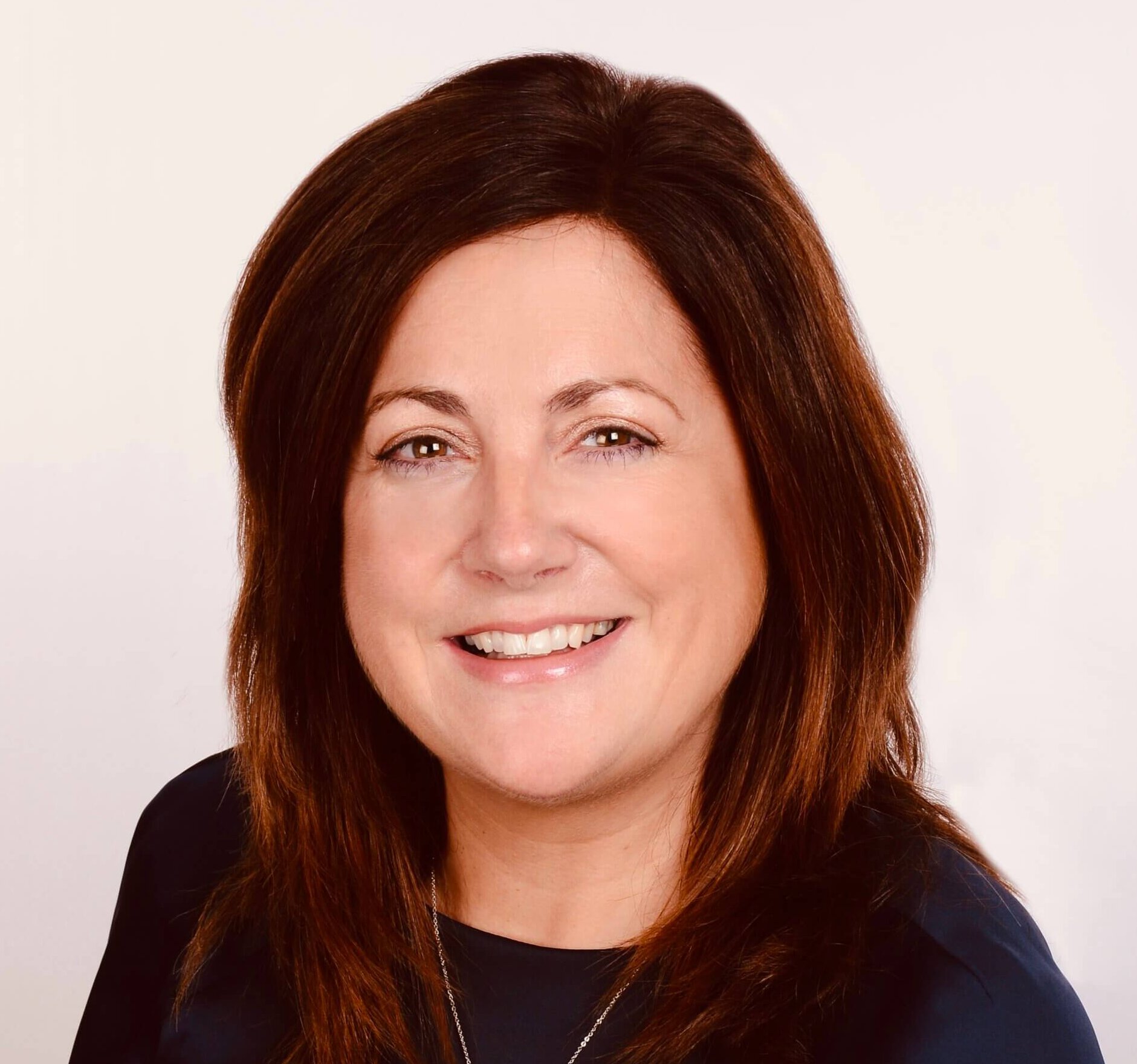
Dr Carina Ginty is the Atlantic Technological University (ATU) lead for the N-TUTORR project and a TU lead for transforming learning, teaching and assessment in the Technological University (TU) sector in Ireland. Funded by NextGenerationEU (value 38 million euro), the aim of this project is to transform teaching, learning and assessment through student empowerment, building staff capabilities and developing the digital campus learning environment. Working in HE since 2004, Carina has led the teaching and learning function across several campuses and initiated various innovation projects in teaching, learning and assessment enhancement, digital pedagogies, student engagement and leadership. From 2019-2022 Carina led the development of DigitalEd.ie, a knowledge platform to build digital teaching and learning capabilities across 8 campuses of the ATU. In 2022, Carina was awarded the President’s Award for Outstanding Institutional Citizenship.
Fabian Dargel
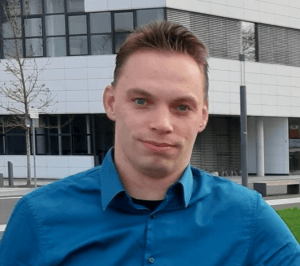
Fabian Dargel is a Scientific Assistant in Programme Management with focus on Business Administration and Taxation at the Faculty of Society and Economics at Rhine-Waal University of Applied Sciences in Kleve, Germany. He has been active in the higher education system for nearly three years as a manager and an educator. He participates in the Erasmus+ project VERSATILE (Virtual Education Readiness Semester – Adaptive Toolbox for an International Learning Experience). The project creates the necessary building blocks for a collaborative online semester abroad in the form of a guide to online teaching methods, offering an adaptive toolbox, and a model curriculum of team-taught modules under the topic of “European Scenarios in Business, Politics and Societal Change in the next Decennium”.
Laura Torres Zúñiga
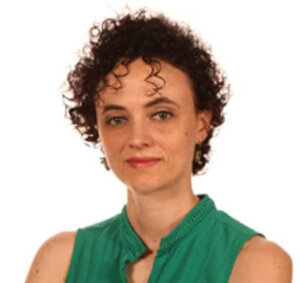
Laura Torres Zúñiga is Associate Professor at the Department of Philologies and Didactics of the Autonomous University of Madrid (UAM), where she teaches English Language, Syllabus Design and Children’s Literature in English to pre-service teachers. She also co-directs the Master’s Program in Attention to Diversity in Bilingual Schools at UAM. A teacher trainer, lecturer and researcher, she holds two Postgraduate Expert Certificates, one in Virtual Learning Environments from the University of Málaga, and another on University Teaching Methodologies from the Autonomous University of Madrid. She is a collaborator in the Erasmus+ European Policy Experiment ‘Virtual Innovation and Support Networks for Teachers’ (VALIANT) as a virtual exchange designer and facilitator. She has recently been awarded the Blended Learning Grand Award 2023.
Chris Thomson
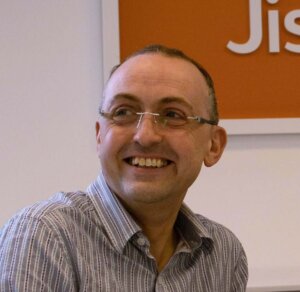
Chris Thomson is the programme lead for teaching, learning and assessment for Jisc’s Advice Team. The advice team works with Universities and Colleges in the UK to develop the use of technology to support pedagogy. Chris has worked in the field of education technology, innovation and change since 2005 and has a Masters qualification in the subject from Sheffield Hallam University. In 2018, he co-designed the digital professional standards framework for post-16 education in Wales. As part of Jisc’s Digital Leadership programme team, he has a special interest in the interplay of data and narrative in organisations. Like many people, is spending a lot of time thinking about the future of AI in learning and assessment.
Channa van der Brug
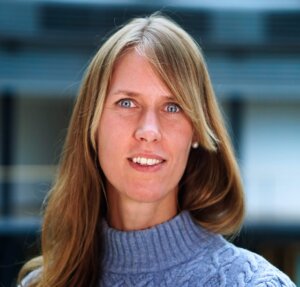
Channa van der Brug is programme manager international affairs at Hochschulforum Digitalisierung (the German Forum for Higher Education in the Digital Age) at Stifterverband, where she is developing opportunities for international knowledge exchange on good practices for digital teaching and learning. She has more than 15 years’ of experience in the education sector and a passion for the role of technology in shaping the future of education, as well as for developing deeper understanding and connections between diverse people and institutions through engagement and dialogue.
Anna Bielecka
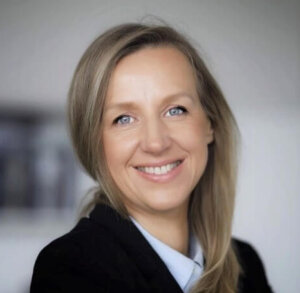 Anna Bielecka is currently Coordinator for Erasmus+ Cooperation Partnerships in Higher Education Unit at Foundation for the Development of the Education System (FRSE). She has been working for higher education sector for more than 20 years and has been invloved for several years in many European projects focused on Erasmus Mundus action promoting joint programmes and internatinalisation in Europe and beyond. Now, she is responsible for implementation of Strategic and Cooperation Partnerships calls in Erasmus+ National Agency in Poland and training of experts in higher education sector.
Anna Bielecka is currently Coordinator for Erasmus+ Cooperation Partnerships in Higher Education Unit at Foundation for the Development of the Education System (FRSE). She has been working for higher education sector for more than 20 years and has been invloved for several years in many European projects focused on Erasmus Mundus action promoting joint programmes and internatinalisation in Europe and beyond. Now, she is responsible for implementation of Strategic and Cooperation Partnerships calls in Erasmus+ National Agency in Poland and training of experts in higher education sector.
Katarina Aškerc Zadravec
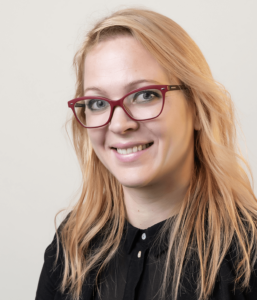 Katarina Aškerc Zadravec is an assistant professor and a vice dean for quality and internationalisation at Ljubljana School of Business, Slovenia. Since 2020, Katarina has been an elected member of the EAIE Expert Community Internationalisation at Home and an active member of the Project Task Group at EUMMAS. She is also an external QA evaluator with experience in national and international evaluation procedures. Katarina has facilitated various training courses and coached academics and international staff in internationalising the curriculum in Slovenia and abroad. She was actively included in the preparation of the Strategy of Internationalisation of Slovene Higher Education, she regularly publishes articles and presents topics related to internationalised home curriculum and is actively included in various (inter)national research and strategic projects. Katarina was trained in teacher education and economy, she holds a PhD in Educational Sciences.
Katarina Aškerc Zadravec is an assistant professor and a vice dean for quality and internationalisation at Ljubljana School of Business, Slovenia. Since 2020, Katarina has been an elected member of the EAIE Expert Community Internationalisation at Home and an active member of the Project Task Group at EUMMAS. She is also an external QA evaluator with experience in national and international evaluation procedures. Katarina has facilitated various training courses and coached academics and international staff in internationalising the curriculum in Slovenia and abroad. She was actively included in the preparation of the Strategy of Internationalisation of Slovene Higher Education, she regularly publishes articles and presents topics related to internationalised home curriculum and is actively included in various (inter)national research and strategic projects. Katarina was trained in teacher education and economy, she holds a PhD in Educational Sciences.
Zdravko Kačič
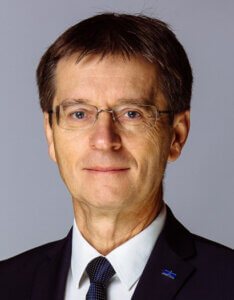 Zdravko Kačič is a full professor at the Faculty of Electrical Engineering and Computer Science of the University of Maribor, Slovenia. His research interests encompass digital signal processing, speech perception, automatic speech recognition and synthesis, and multimodal communication. He gives several courses in the undergraduate and postgraduate study programmes in electrical engineering and telecommunications and PhD courses in digital signal processing. Between 2011 and 2015, he was vice-rector of the University of Maribor for financial matters. Since 2011, he has participated in various government expert groups in higher education legislation. Since 2018 he has been rector of the University of Maribor. From 2020 to 2021, he was president of the Slovenian Rectors Conference and from 2021 to 2022 president of the Danube Rectors Conference.
Zdravko Kačič is a full professor at the Faculty of Electrical Engineering and Computer Science of the University of Maribor, Slovenia. His research interests encompass digital signal processing, speech perception, automatic speech recognition and synthesis, and multimodal communication. He gives several courses in the undergraduate and postgraduate study programmes in electrical engineering and telecommunications and PhD courses in digital signal processing. Between 2011 and 2015, he was vice-rector of the University of Maribor for financial matters. Since 2011, he has participated in various government expert groups in higher education legislation. Since 2018 he has been rector of the University of Maribor. From 2020 to 2021, he was president of the Slovenian Rectors Conference and from 2021 to 2022 president of the Danube Rectors Conference.
Bridie Killoran
 Bridie Killoran – ATU Career and Learning Pathways Manager (HCI HigherEd 4.0 Project) managing the establishment of a Regional Service for Careers and Learning Pathways, including Recognition of Prior Learning (RPL) for people in the workplace. Over 18 years’ experience of managing, developing and delivering excellent outcomes for the careers advisory and guidance services in higher education. Thorough understanding of national and international labour market skills and knowledge requirements sought by employers. Experienced in the design and development of career learning pathways, including employability frameworks and RPL to help graduates and employees achieve career success and sustainable lifelong employability. MSc in Careers Guidance: University of Ulster, Diploma in Careers Guidance in Higher Education: University of Reading B.Sc. (Management): Trinity College Dublin and Dublin Institute of Technology Accredited professional development in RPL, neurolinguistic programming, universal design in teaching and learning, facilitation, coach practitioner and other psychometric assessments.
Bridie Killoran – ATU Career and Learning Pathways Manager (HCI HigherEd 4.0 Project) managing the establishment of a Regional Service for Careers and Learning Pathways, including Recognition of Prior Learning (RPL) for people in the workplace. Over 18 years’ experience of managing, developing and delivering excellent outcomes for the careers advisory and guidance services in higher education. Thorough understanding of national and international labour market skills and knowledge requirements sought by employers. Experienced in the design and development of career learning pathways, including employability frameworks and RPL to help graduates and employees achieve career success and sustainable lifelong employability. MSc in Careers Guidance: University of Ulster, Diploma in Careers Guidance in Higher Education: University of Reading B.Sc. (Management): Trinity College Dublin and Dublin Institute of Technology Accredited professional development in RPL, neurolinguistic programming, universal design in teaching and learning, facilitation, coach practitioner and other psychometric assessments.
Sanja Jedrinović
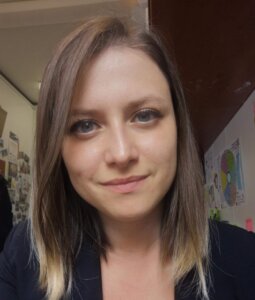 Sanja Jedrinović is head of the department for didactical ICT support at the University of Ljubljana’s Centre for the use of ICT in the pedagogical process. Through the management and implementation of various support activities for higher education teachers, she promotes the development of reflections on the didactic, meaningful use of ICT in various fields of study. She has developed various online courses to promote the development of digital competencies of teachers and manages and organises various trainings on the use of ICT to support the development of digital resources, innovative teaching and learning, knowledge assessment and student empowerment. She collaborates with higher education teachers on projects to redefine their courses using ICT and organises and participates in internal projects on project-based e-learning, e-portfolio building, micro MOOC development and artificial intelligence in education.
Sanja Jedrinović is head of the department for didactical ICT support at the University of Ljubljana’s Centre for the use of ICT in the pedagogical process. Through the management and implementation of various support activities for higher education teachers, she promotes the development of reflections on the didactic, meaningful use of ICT in various fields of study. She has developed various online courses to promote the development of digital competencies of teachers and manages and organises various trainings on the use of ICT to support the development of digital resources, innovative teaching and learning, knowledge assessment and student empowerment. She collaborates with higher education teachers on projects to redefine their courses using ICT and organises and participates in internal projects on project-based e-learning, e-portfolio building, micro MOOC development and artificial intelligence in education.
Pictures


